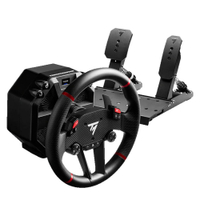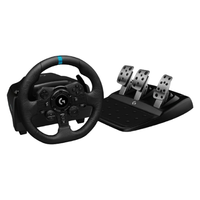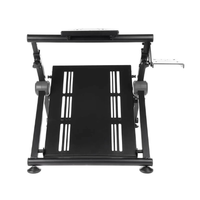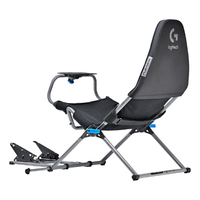Best PC racing wheels in 2025: my favorite direct drive and budget steering wheels for sim racing
Speed away with the best PC racing wheel for gaming.
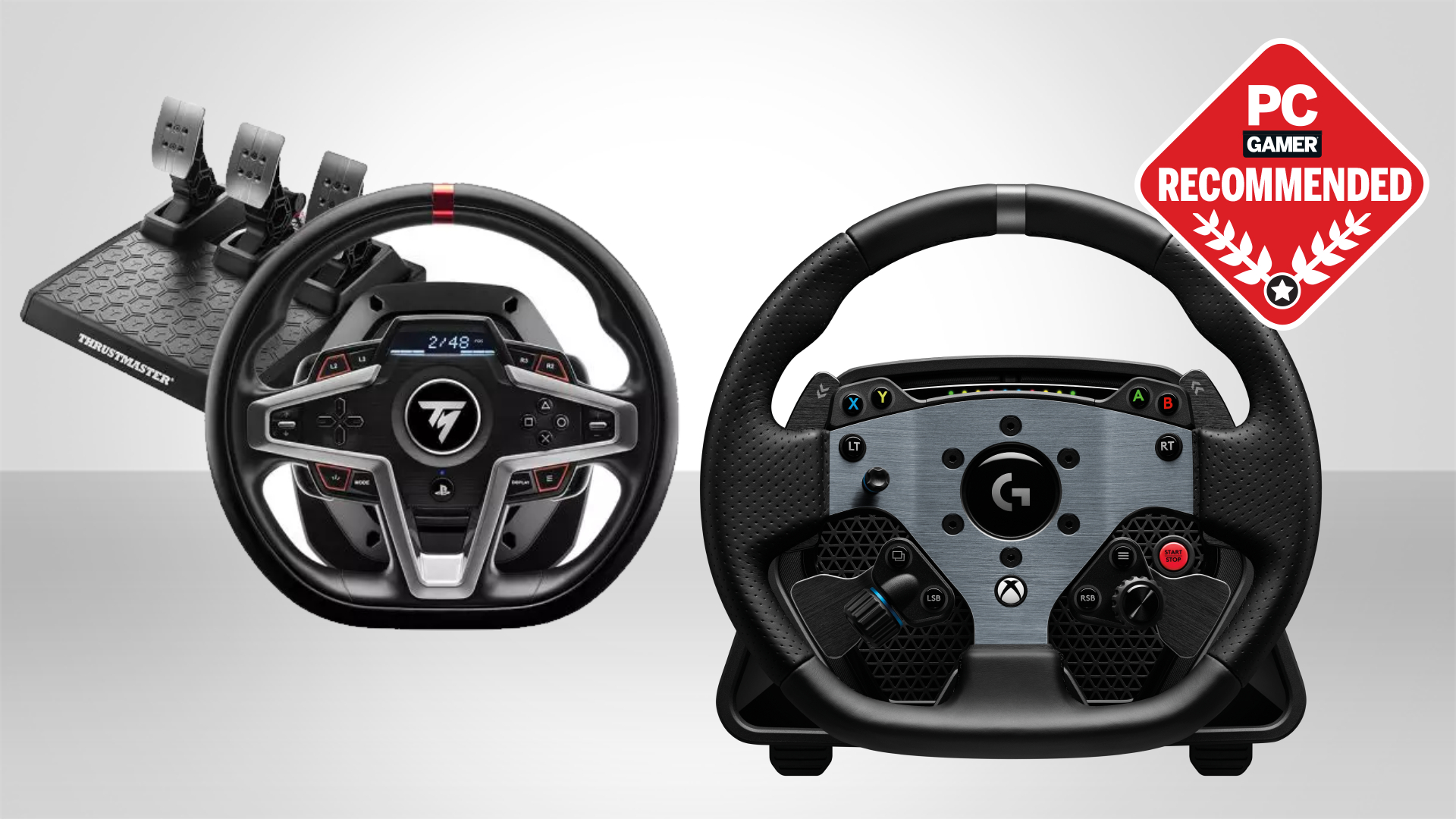
I've burned rubber with all the best PC racing wheels to see which one earns first place on the podium. All the wheels included in this guide have been put through their paces in a range of racing games, and from that time in-game, I've decided on the best to buy across a wide range of budgets—from mighty direct drive bases to affordable wheel and pedal combos.
The absolute best PC racing wheel is the Logitech G Pro Racing Wheel. It has a gigantic 11 Nm of direct drive torque for plenty of detailed steering feedback without clipping, an easy-to-use interface, well-placed buttons, and a fantastic pedal set, although you do have to buy them separately. The best budget racing wheel is the Thrustmaster T128, a hybrid drive wheel with superb paddle shifters and a good amount of responsive grunt, along with plenty of wheel-mounted buttons for all your in-game controls.
Generally, cheaper setups tend to have gear-driven systems, and the quality of that system can vary somewhat. Direct drive, however, attaches you directly to a powerful motor, giving a much more accurate driving feel. Direct drive is where you want to be for ultimate immersion, but cheaper setups will do you just fine for starters.
A racing wheel is one of the best PC gaming buys, and I've tried out tons of wheels to get a handle on which ones are worth your hard-earned cash. You don't have to spend a lot to tear up the tarmac, but you can always amp up your setup with a wheel and pedal stand, like the Playseat Trophy.

When it comes to racing wheels Jacob has tested just about everything you can think of, from gear-driven budget options all the way up to the high-end direct drive wheels of your dreams. This makes him uniquely qualified to give you the low down on the best of the best, and make sure you go into your next race with a wheel that can truly do justice to all of the best driving games.
June 5, 2025: We have gone through our list to check over both formatting and our picks for the best PC racing wheels. The remains untouched, as we are recommending the best wheels out there right now.
April 30, 2025: We've given our recommendations a thorough going over, checking to make sure they're still the best wheels you can buy for the money today. The copy has been tidied, the links have been checked, and the racing begins here. Start your engines.
March 27, 2025: We have removed the Logitech G923 Trueforce as the 'easiest for beginners' and moved it into 'also tested'. For beginners, the best choice is probably one of the two budget choices or the Fanatec if you have the cash for it. As well as this, we have checked through language and formatting.
The quick list
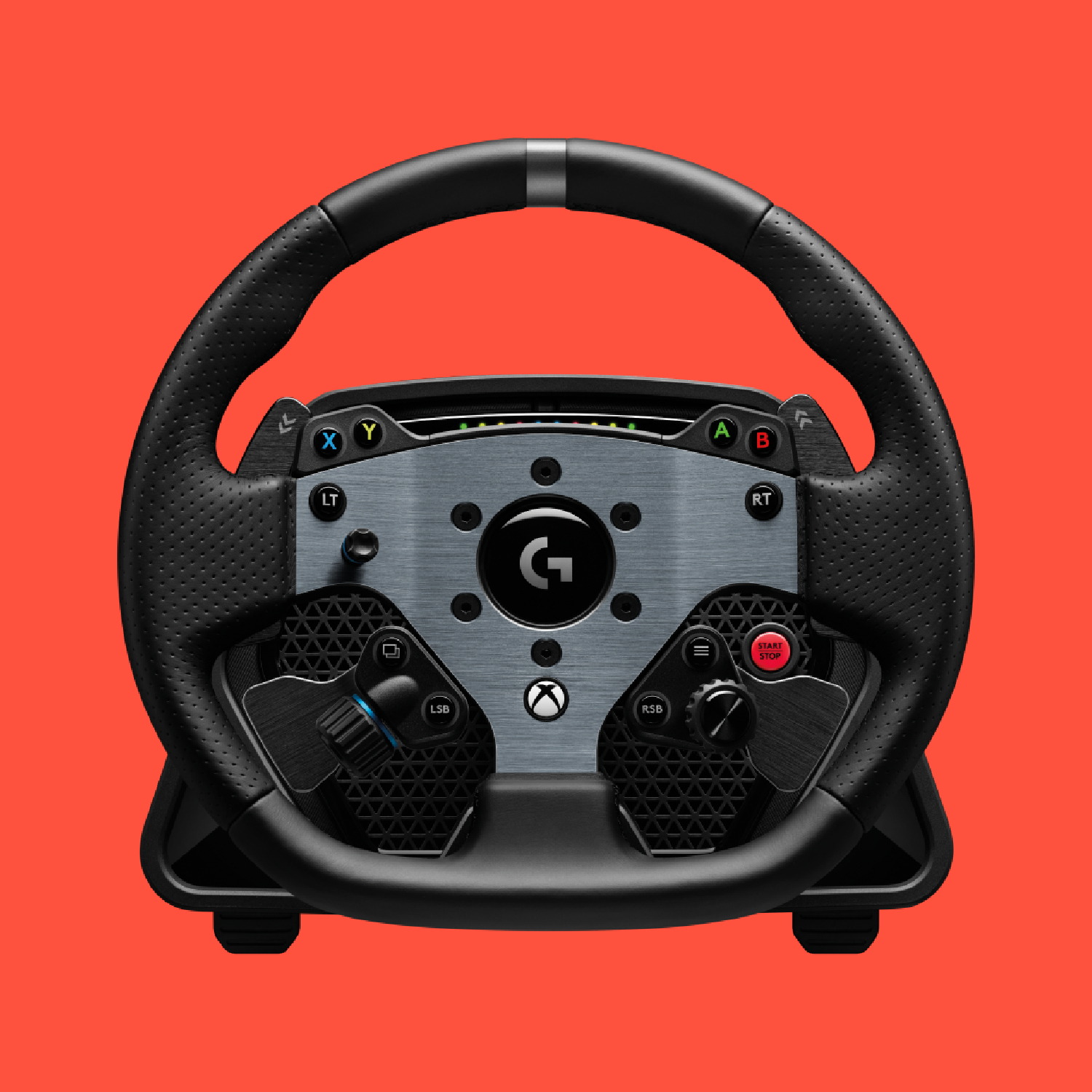
Best overall
The Logitech G Pro Racing Wheel is our pick for the best PC racing wheel, thanks to its ferocious amounts of direct drive torque, detailed feedback, and ease of use.
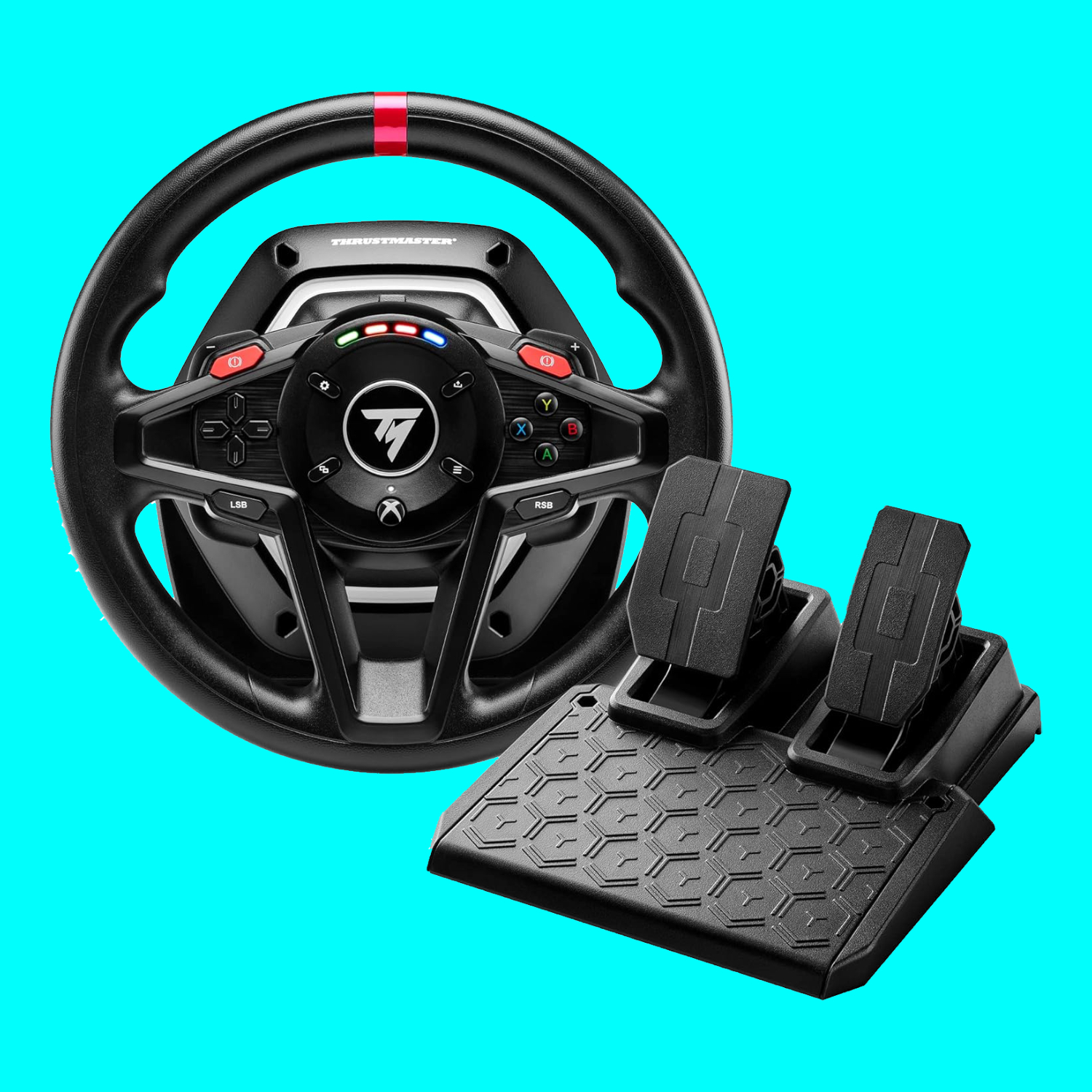
Best budget
This wheel is plenty responsive, with great paddle shifters and well-placed buttons. The pedals are far from fantastic, but as a budget package, the T128 makes for a good, cheap entry point.
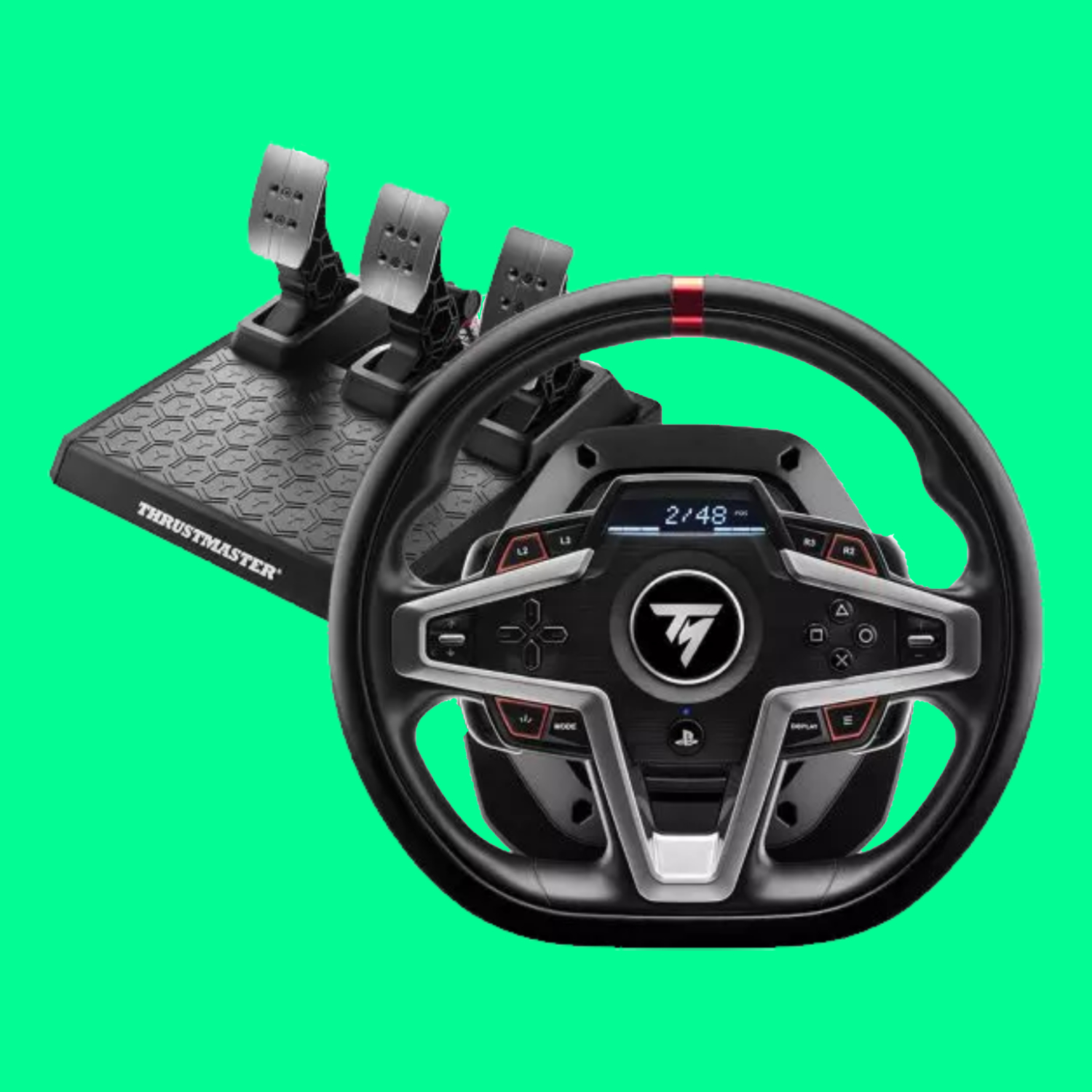
Best mid-range
The Thrustmaster T248 delivers an impressive level of force-feedback for its price, and it's very accurate thanks to its hybrid belt drive and geared system. The shifter paddles are as responsive as you like, if a bit noisy, and the magnetic pedals are very good.
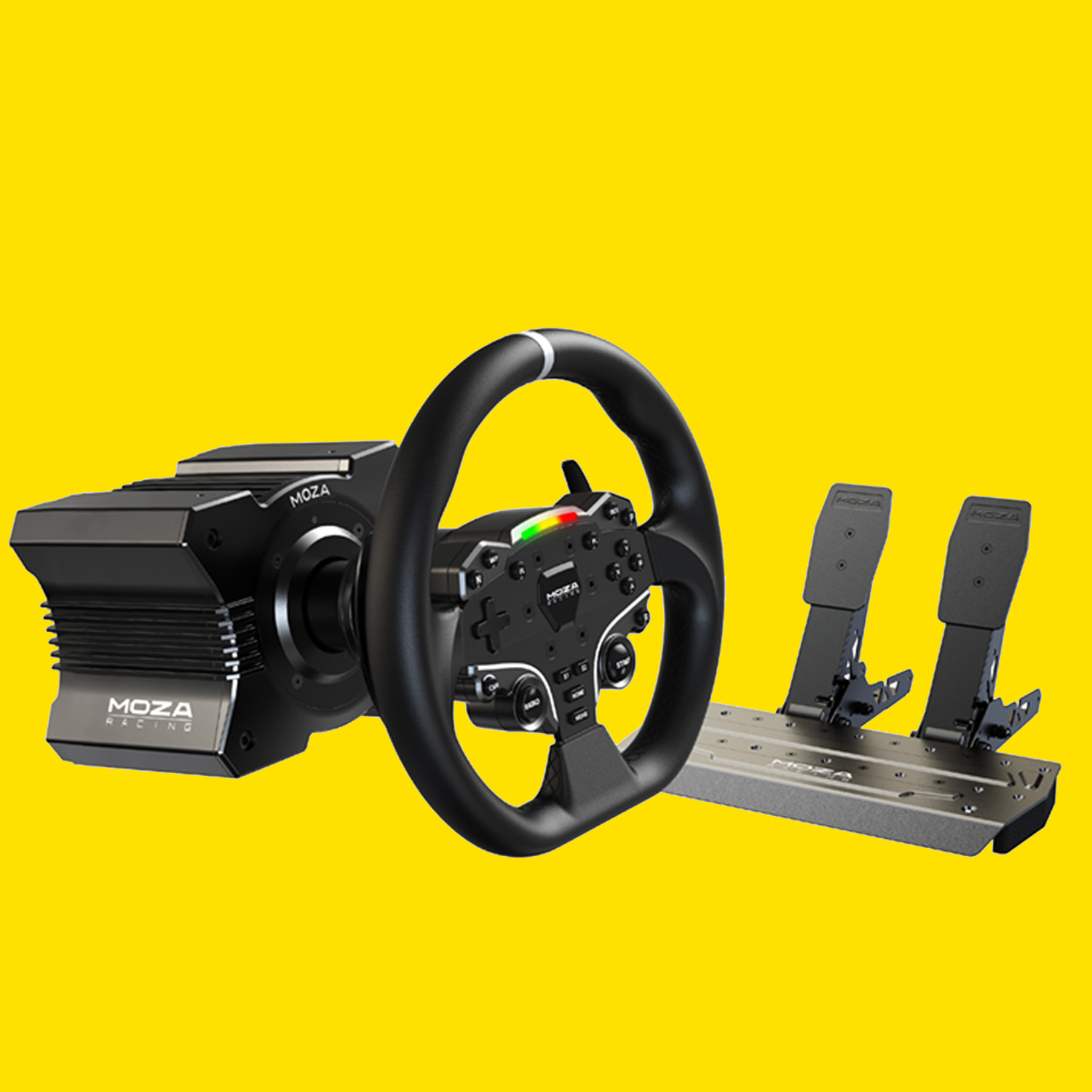
Best budget direct drive
We had thought it near-impossible to find a direct drive racing wheel for a slim budget, then the Moza R5 came along. With excellent feedback and plenty of features, it's a real steal at its asking price.
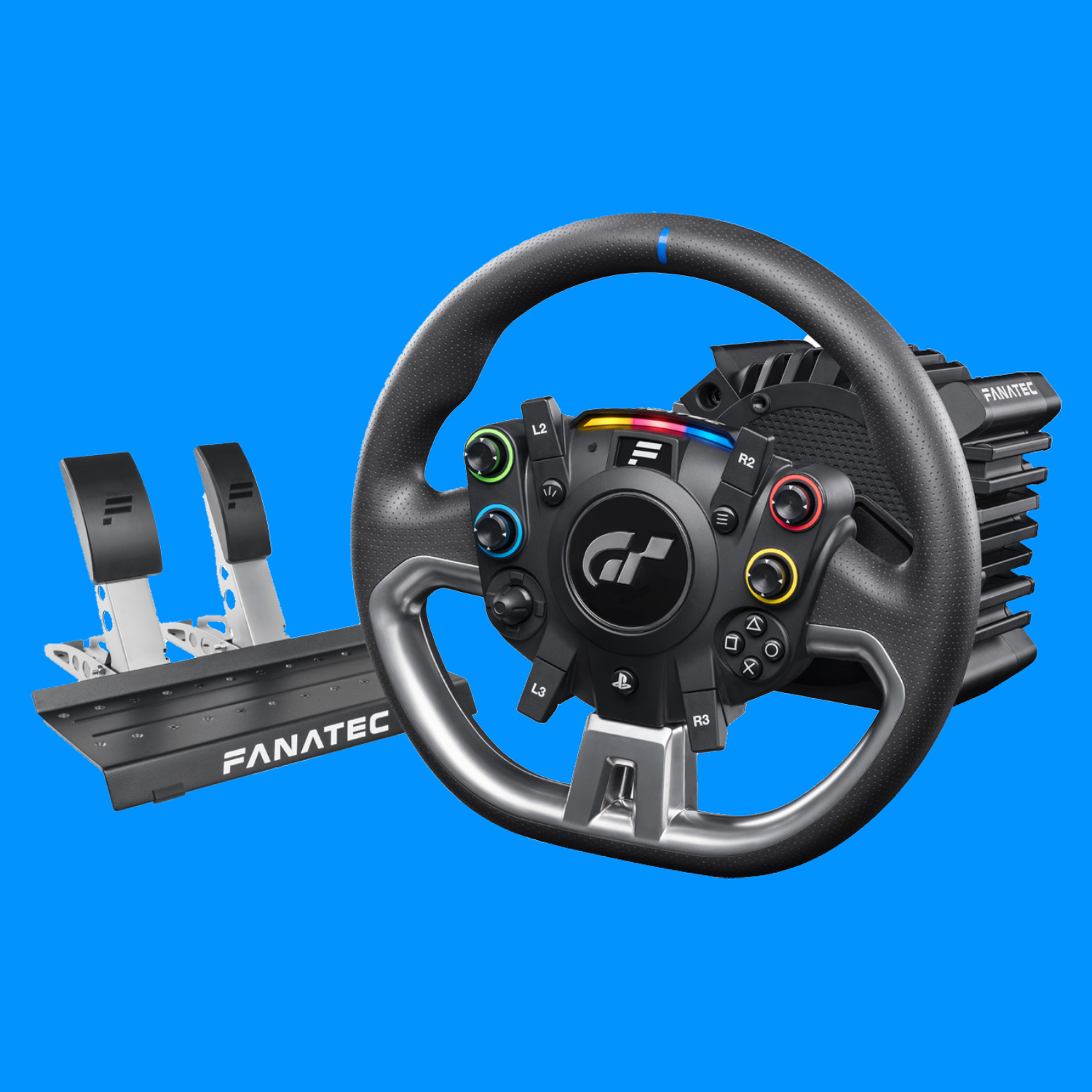
Most upgradeable
The Fanatec GT DD Pro makes a compelling case for itself as a brilliant direct drive wheel, with its accurate and powerful force feedback and excellent build quality.
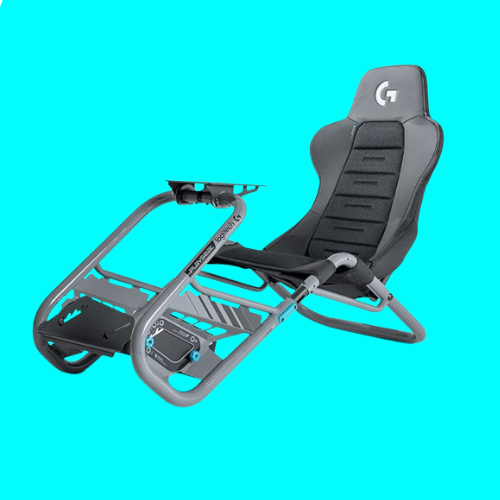
Best sim racing cockpit
Thanks to its great levels of comfort, super adjustable design, and strong build quality, the Playseat Trophy Logitech G Edition is an excellent choice for anyone who likes to spend hours immersed in sim racing games.
Best racing wheel
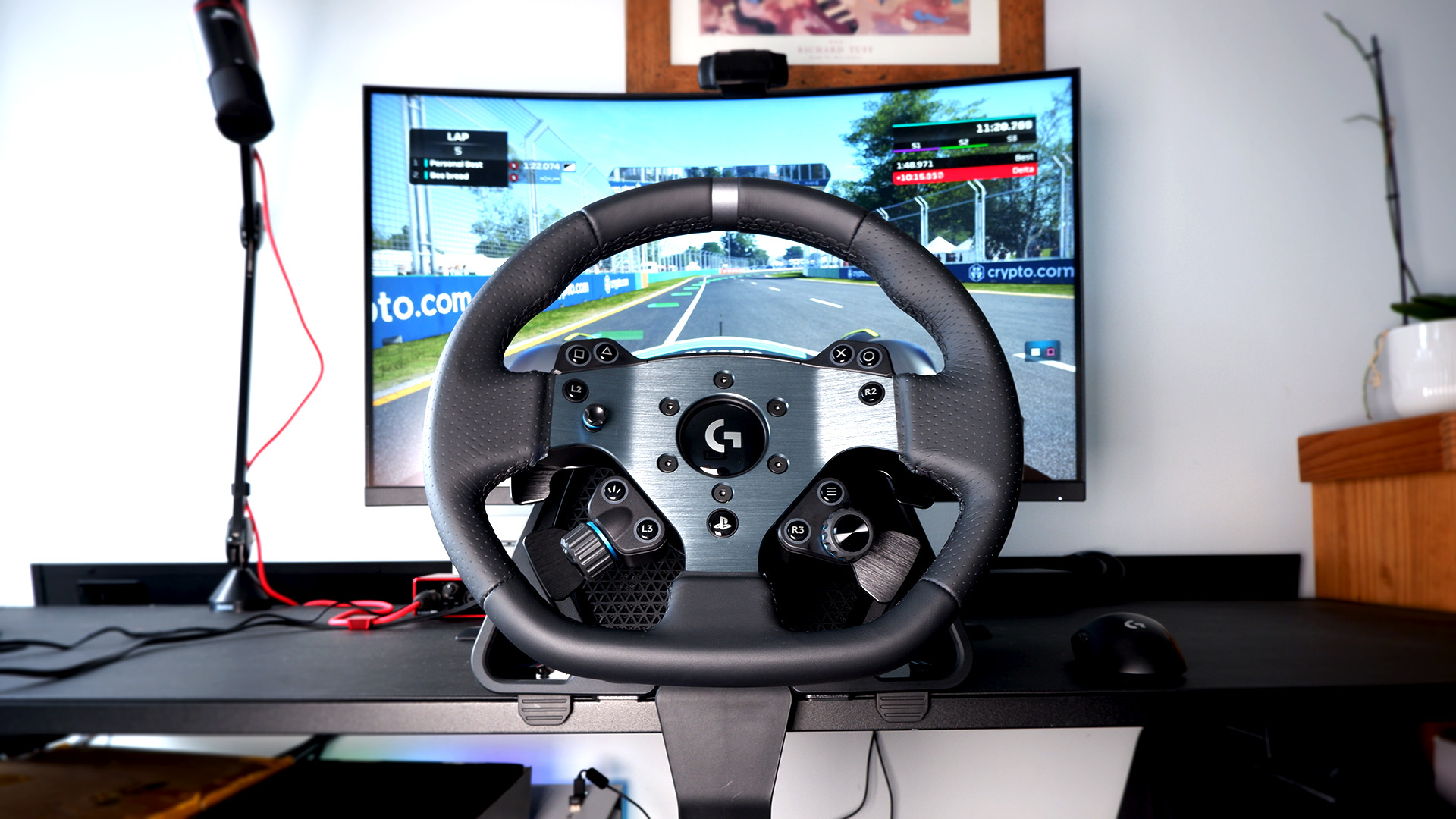
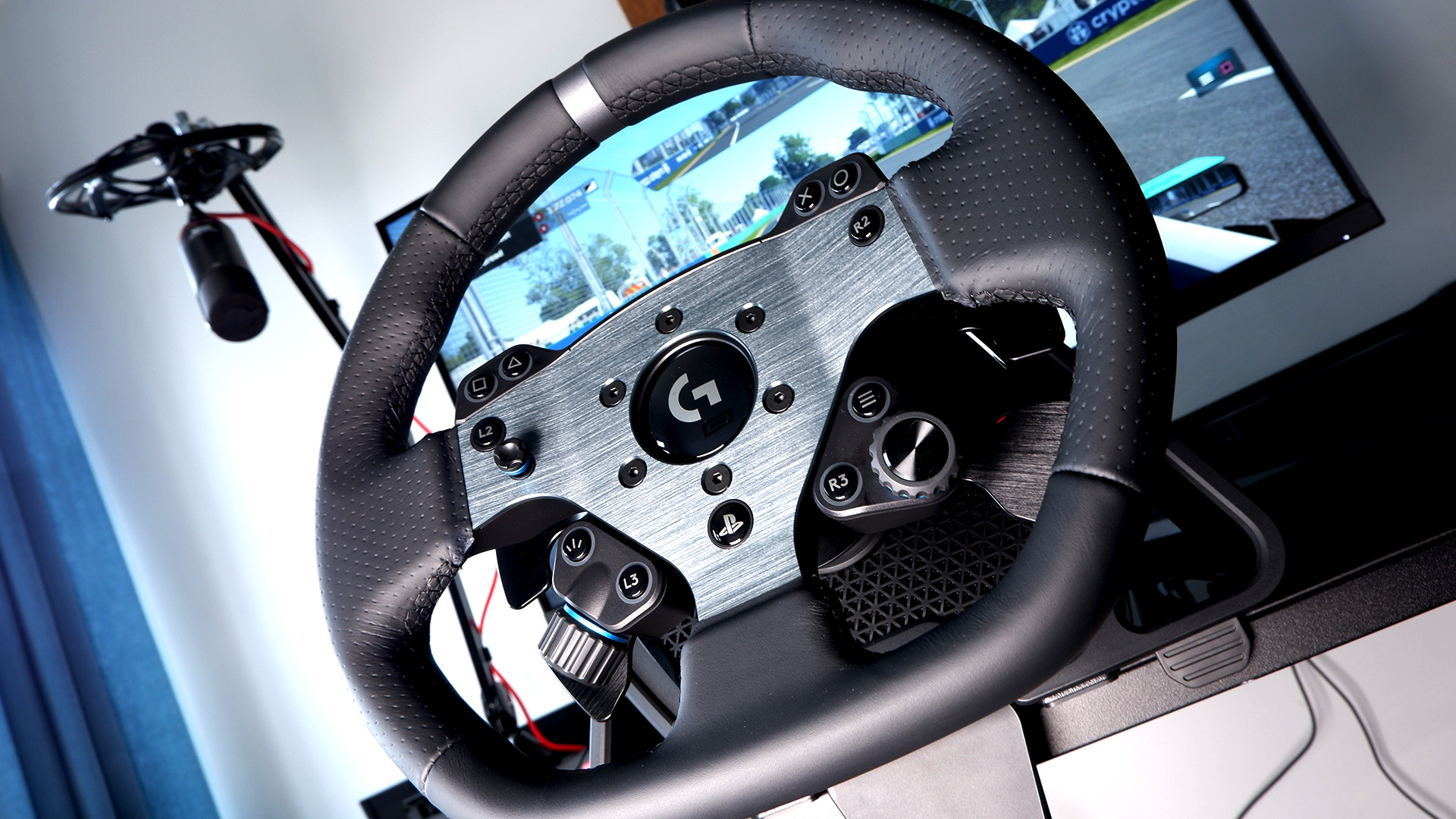
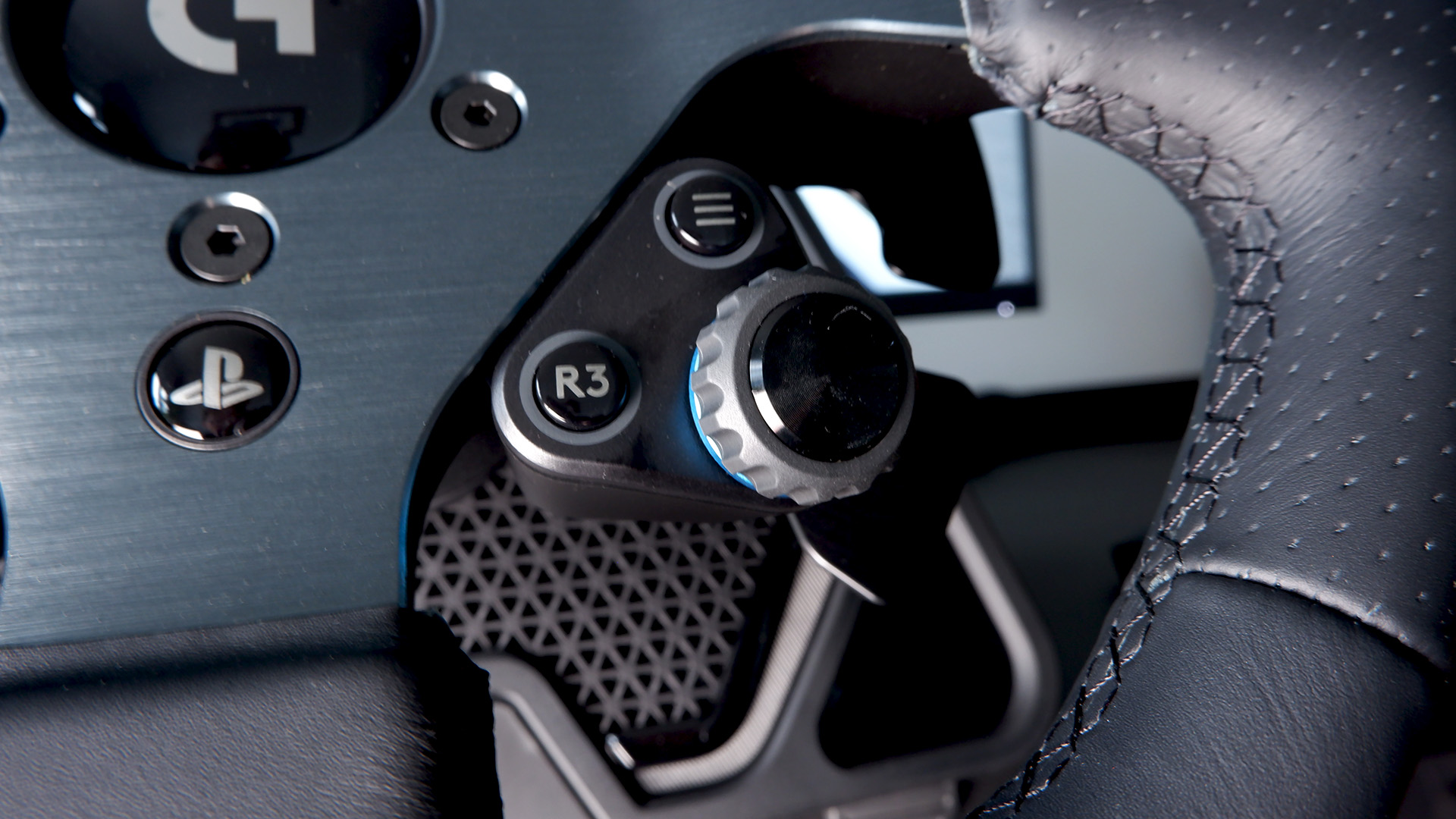
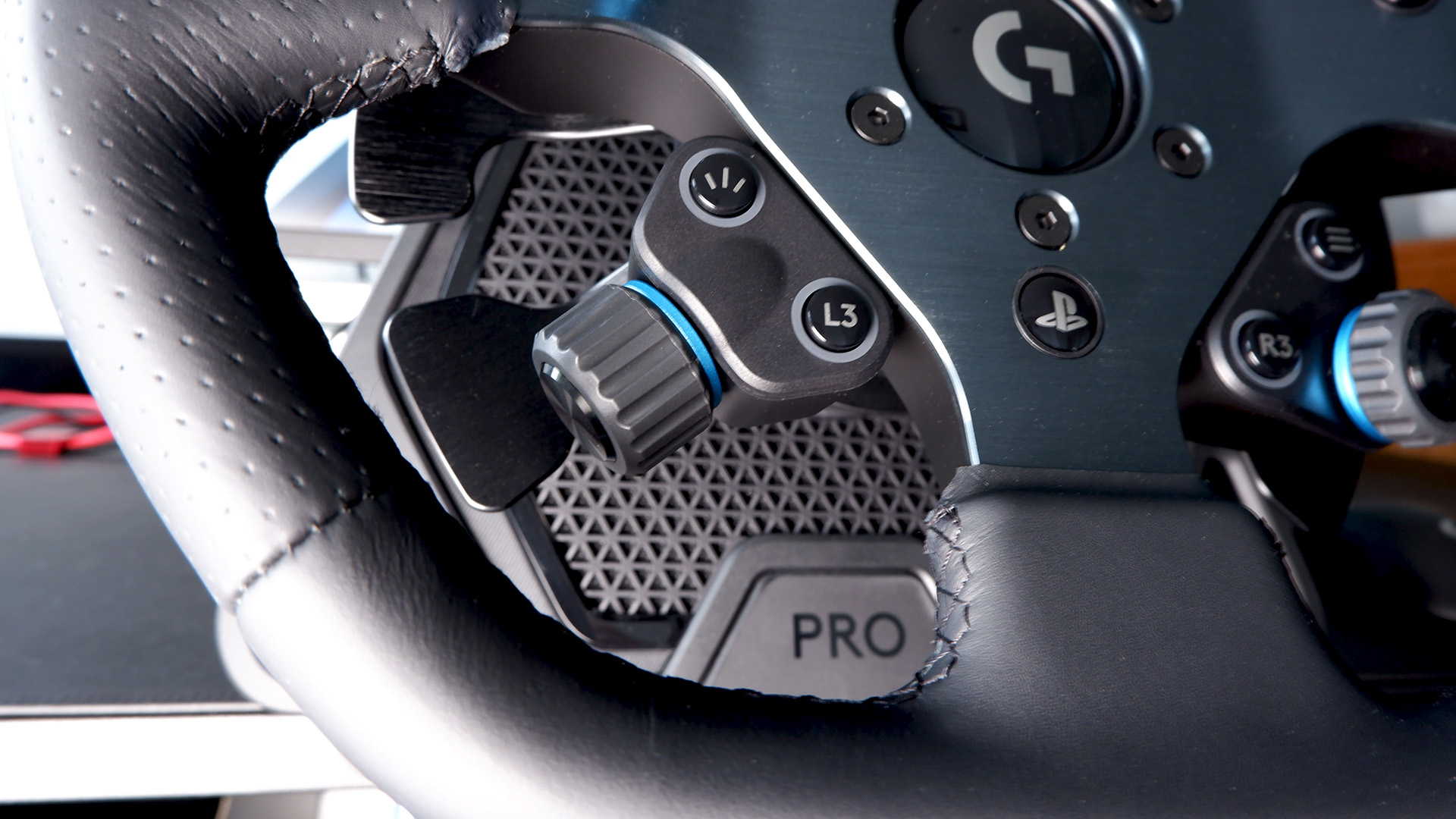
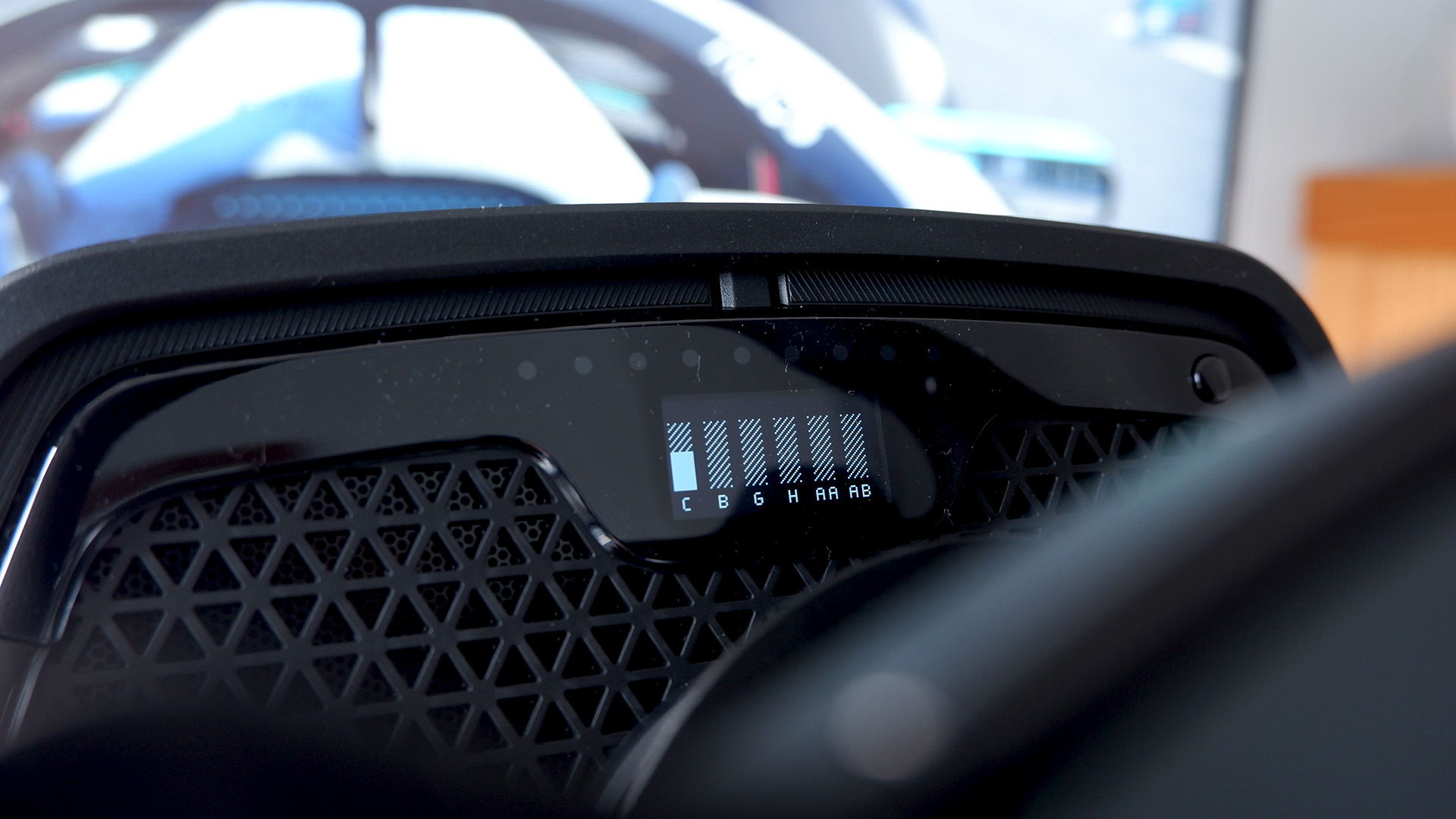
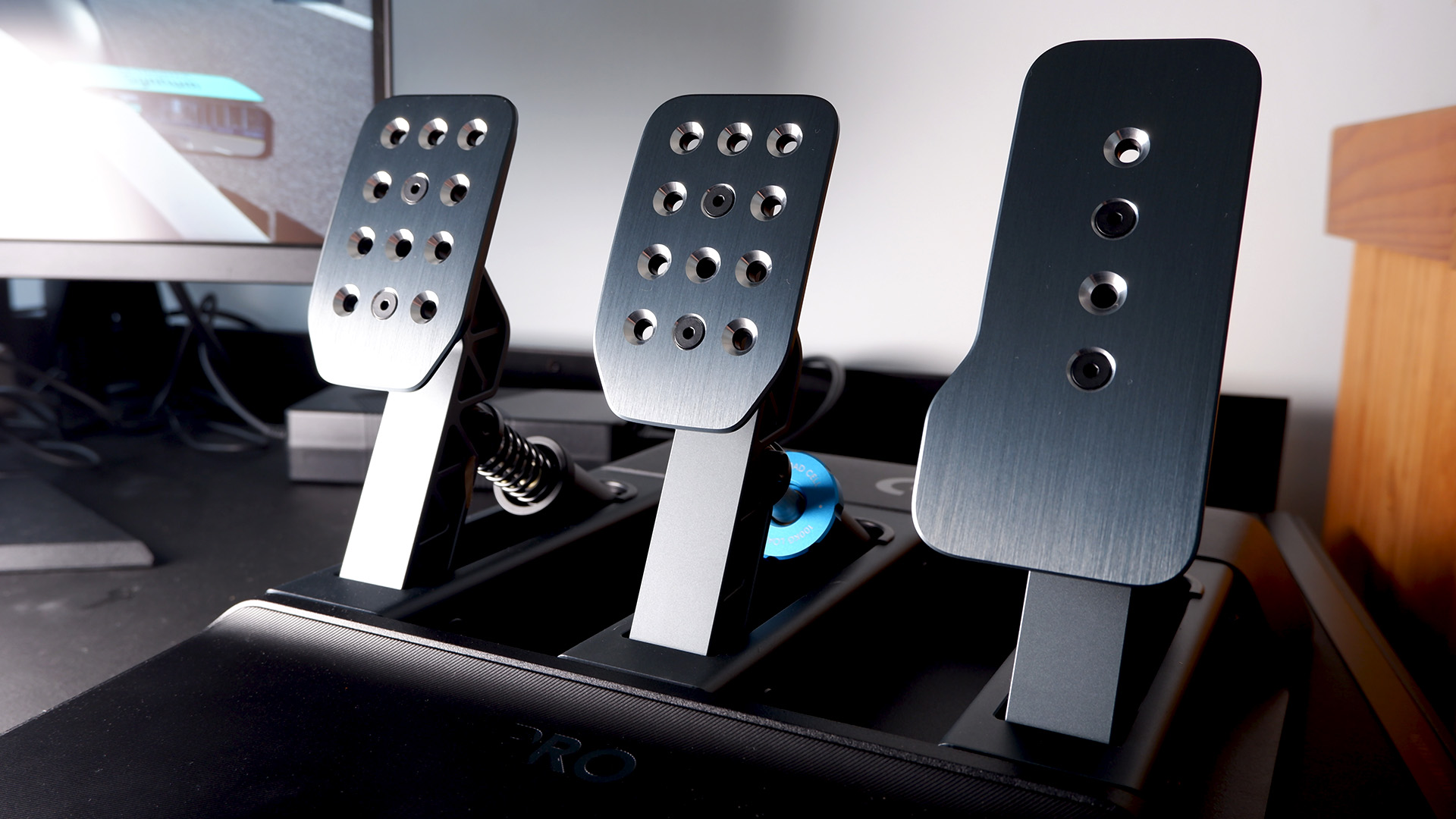
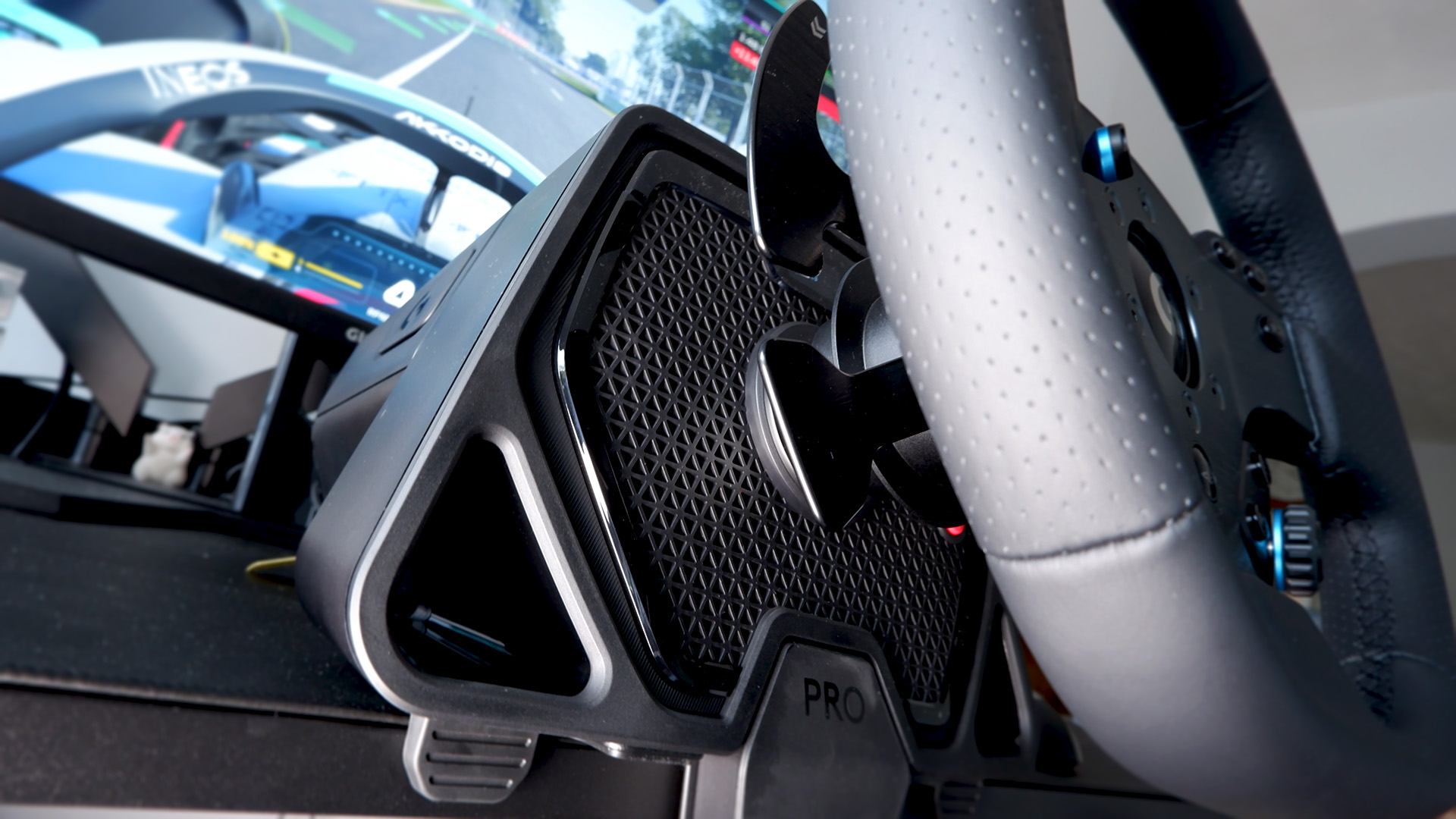
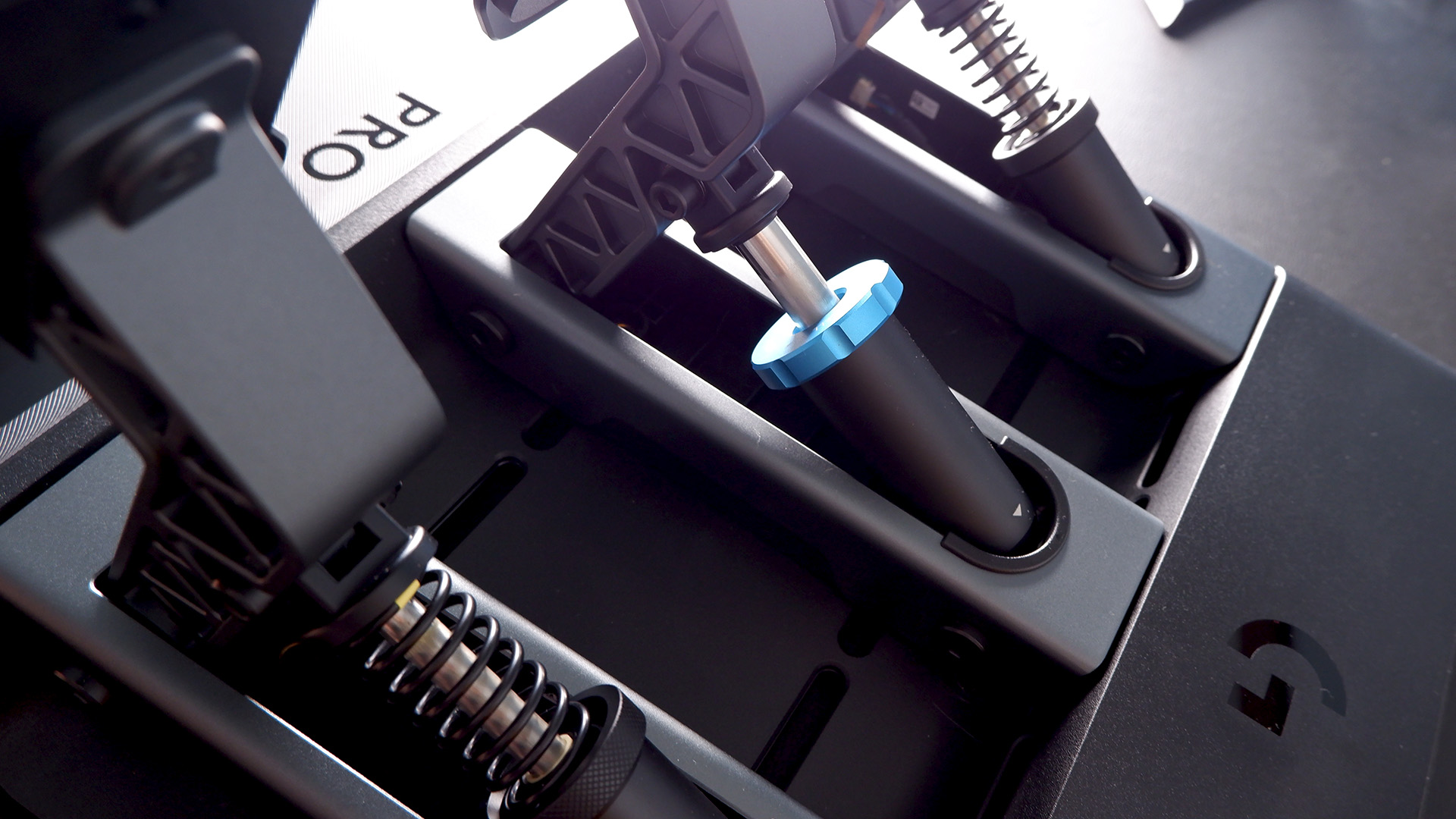
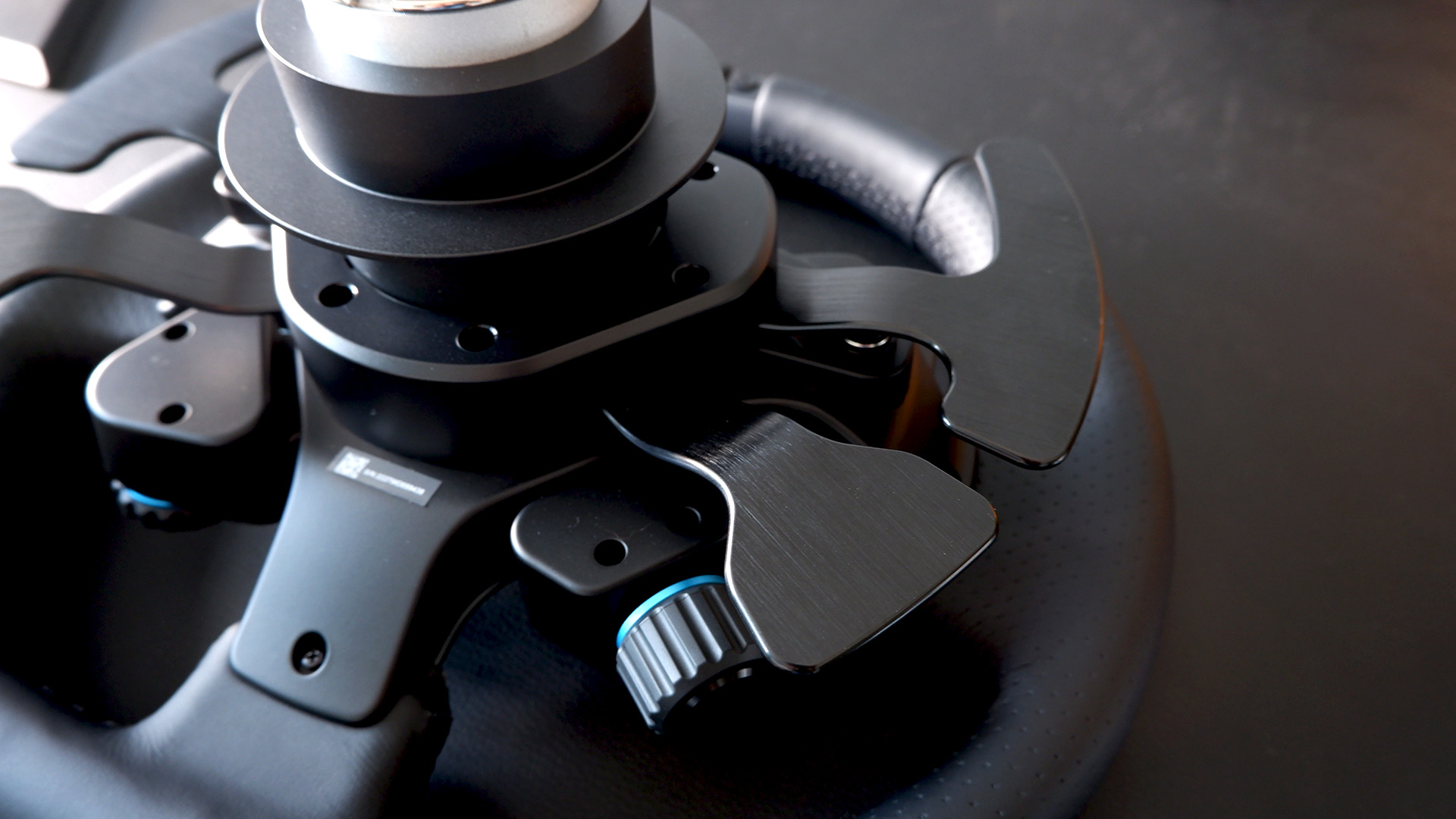
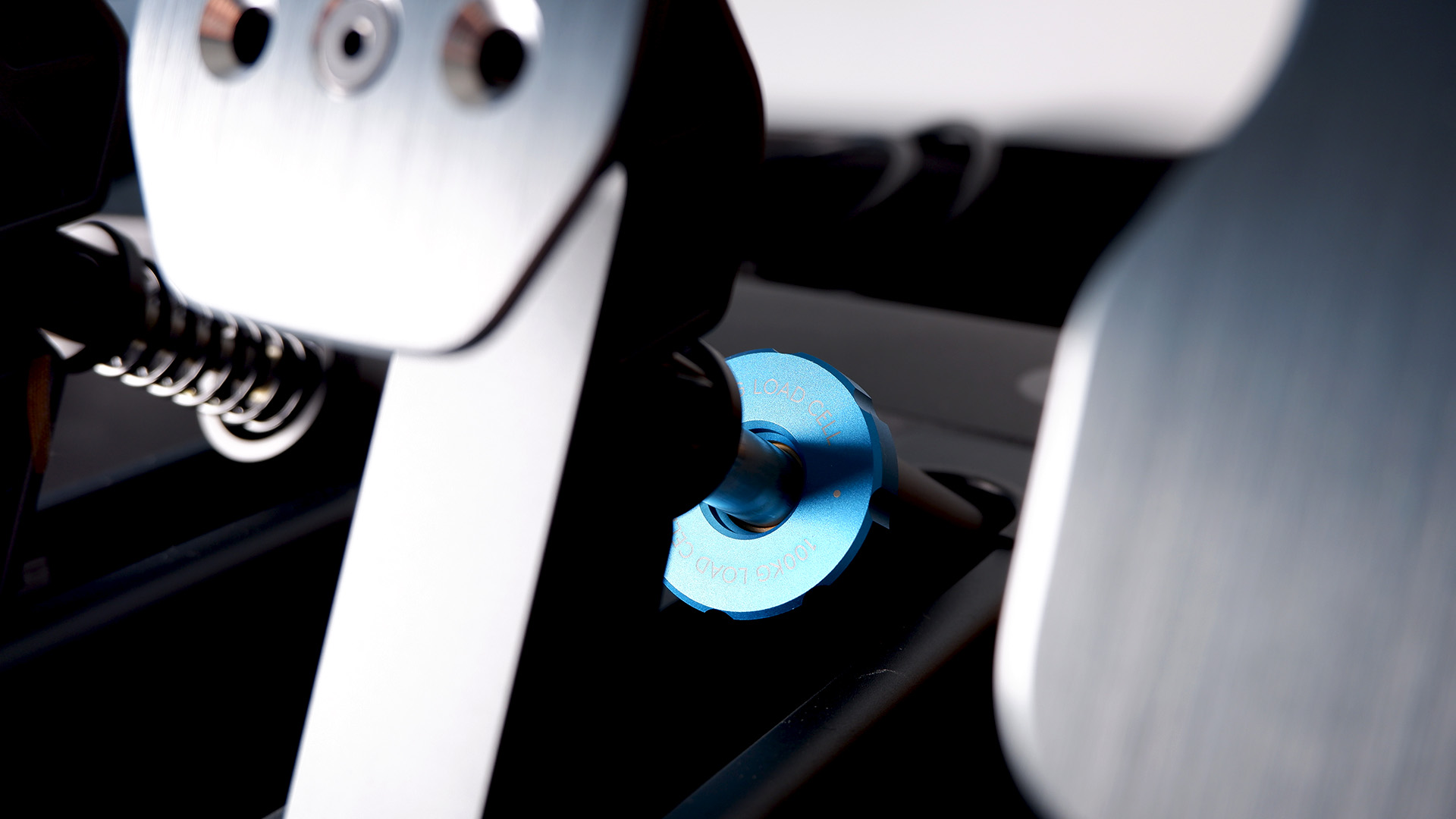
Specifications
Reasons to buy
Reasons to avoid
✅ You want huge amounts of feedback: The Logitech Pro racing wheel is capable of delivering a forearm-shredding amount of torque, which can be adjusted if it's a bit too much to handle. Nice to have, though.
✅ If you're looking for a detailed, immersive experience: It's not just powerful, but well-built, well-thought out and premium in every way.
❌ You're on a budget: How much?! Yep, at $1,000/£1,000 for the base unit without pedals, it's very expensive. On the other hand, you are getting the best racing wheel we've ever tested.
The Logitech Pro Racing Wheel and Pro Racing Pedals is our pick for the best racing wheel, as it's a frightfully powerful combination for sim racing. The gear-driven motor system so often found in Logitech's racing wheels is gone. In its stead, the Pro Racing Wheel comes with a direct drive motor that will shake you all the way down to your little racing booties.
The Pro Racing Wheel delivers a staggering 11 Nm (Newton-metres) of torque. That's a huge amount of power, and while the absolute top units can put out 25 Nm of torque, 11 Nm is more than enough to throw you around in your seat if you let it.
Logitech's wheel can give you a truly race-car-like experience thanks to its ability to really make you feel like you've got some huge tyres under your hands, although some will prefer to turn it down a bit to take some of the strain off your poor little forearms. Not me, though, I'm big and strong.
Compared to the Fanatec CSL DD, Logitech's 11 Nm is much more powerful next to Fanatec's baseline 5 Nm. However, the Fanatec wheelbase can deliver up to 8 Nm torque with a secondary adapter for extra dosh.
You'll need to spend a bit more cash on the Logitech if you want the full experience as well, as the pedals come separately. That being said, while the Pro Racing Pedal set is absolutely brilliant, it's not exactly cheap. But given what you get here, the pedals are actually pretty good value for what you end up receiving. This is a three-pedal set, including two metal-plated brake and clutch pedals and a large gas pedal.
The inclusion of a clutch pedal as standard is much appreciated, as that provides you with a lot more options. However, the real icing on the cake is the load-cell brake, which mimics the feeling of a real car's braking system and provides a huge dose of immersion. Once you've used a load-cell brake kit, you won't want to use anything else.
Another highlight is the dual-clutch paddles beneath the already brilliant shifters. These are for games where a racing-style clutch is required for launching the car at the start, like F1 23, and you can customise them to your heart's content for all sorts of uses.
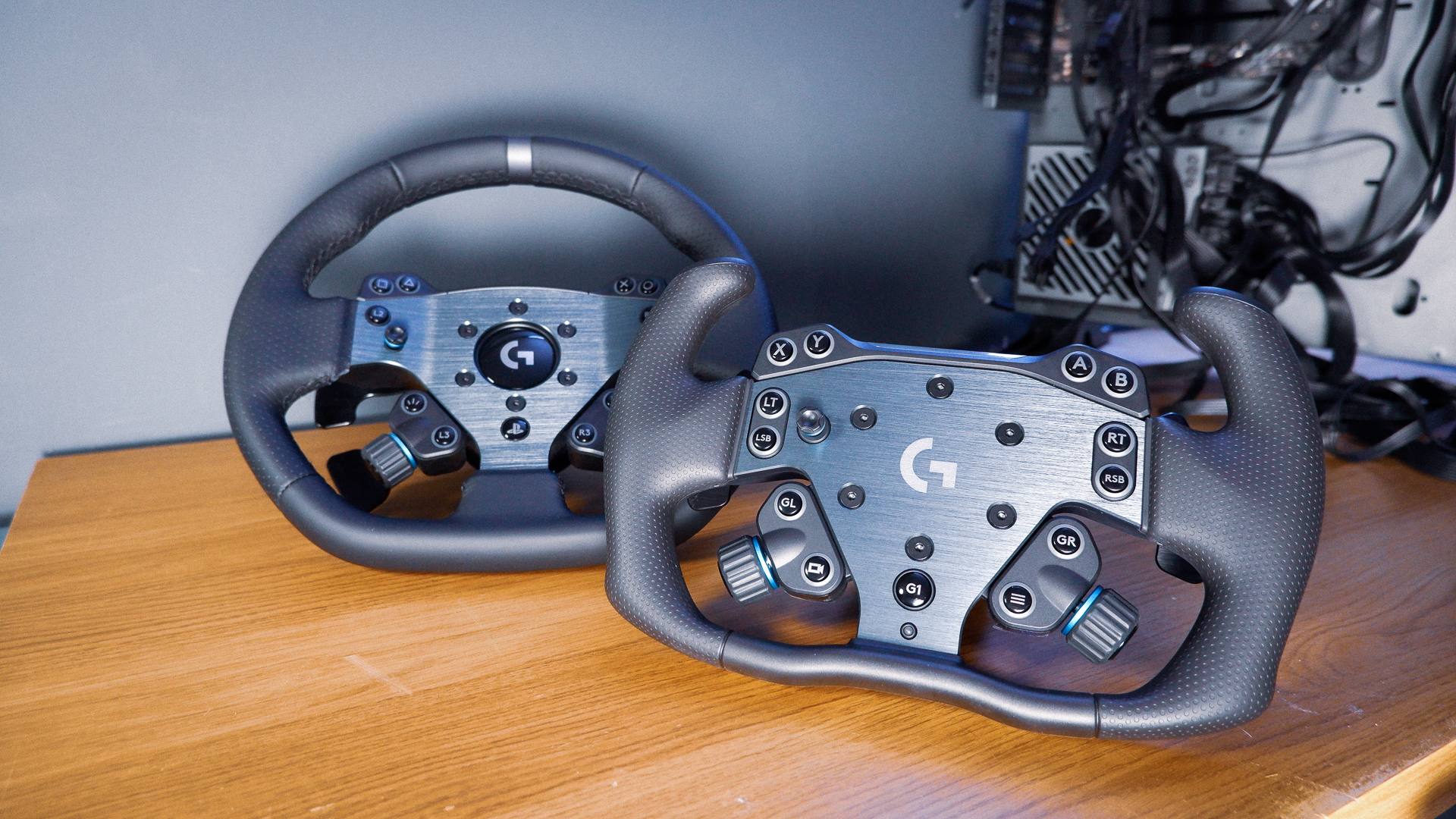
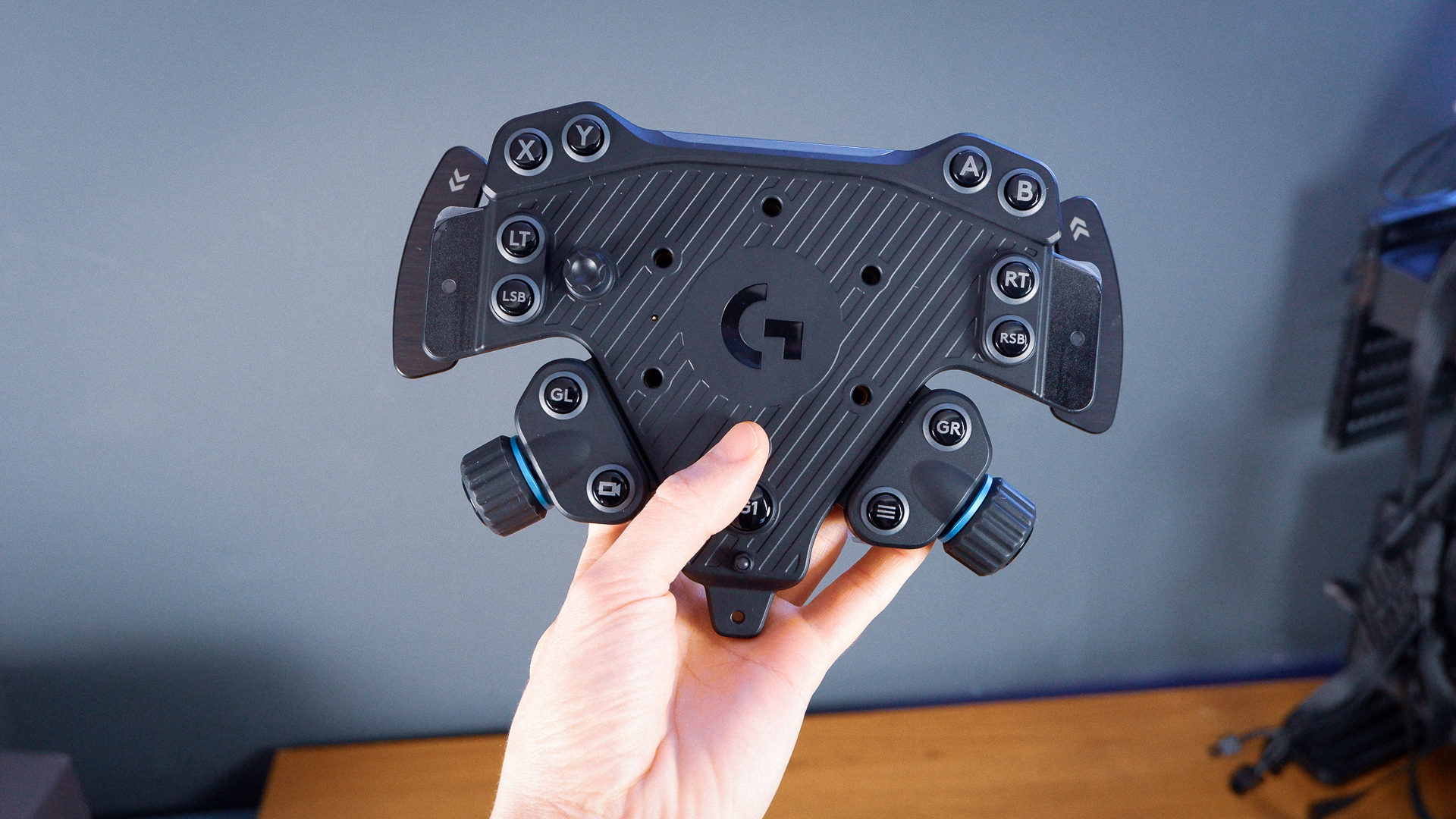
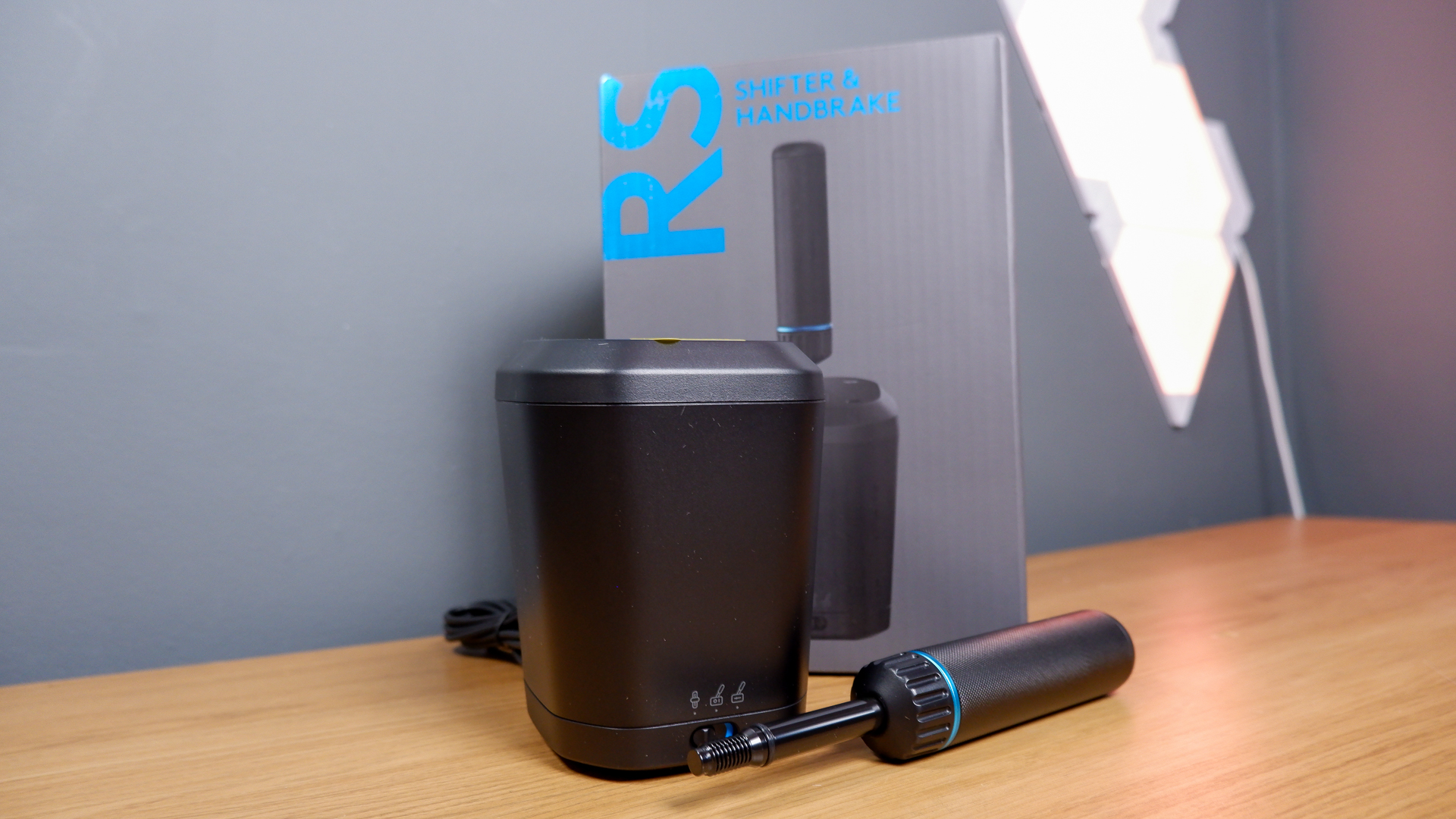
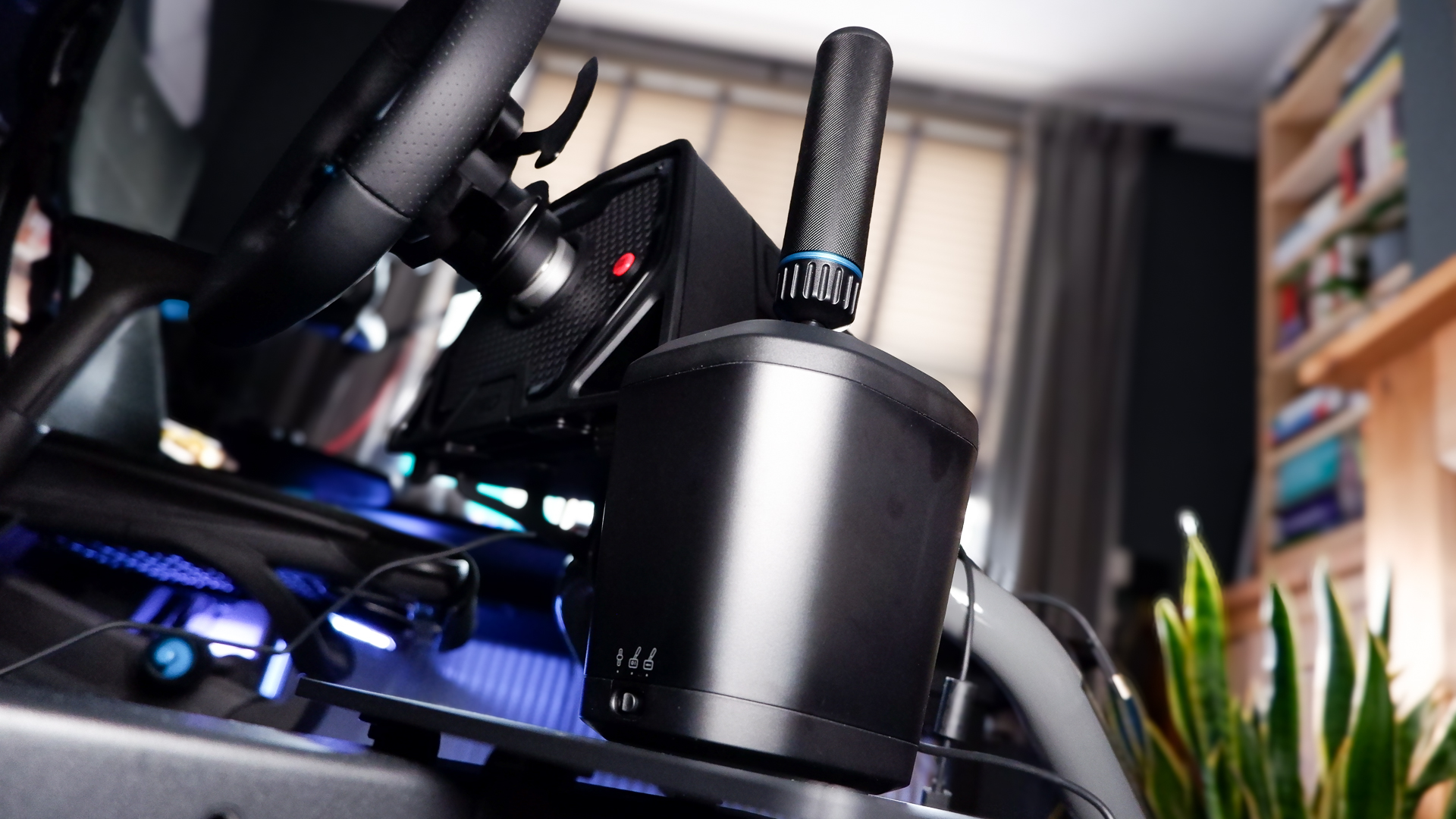
In the past, one of the bigger downsides of the Pro wheel was that you were locked into a style and feel. Logitech has since put out a whole host of accessories—check our reviews for the G RS Wheel Hub + Track Wheel and the RS Shifter + Handbrake to see just how much you can customize the base setup.
That brings us to the price. There's no getting around it, it's a lot of money to spend on a PC peripheral, and if you're looking to spend less—but won't settle for less than direct drive—the Moza R5 below is more your speed.
However, the Logitech Pro Racing kit feels as much a high-end offering in power and performance as it should for the price, and it'll come as no surprise that every detail and every material screams premium, long-lasting quality as we've come to expect from Logitech over the years.
It's our overall best racing wheel for a reason, and all that power, convenience, detail, and build quality make it our absolute top pick for PC racing wheel bliss.
Read our full Logitech G Pro Racing Wheel and G Pro Pedals review.
Best budget racing wheel
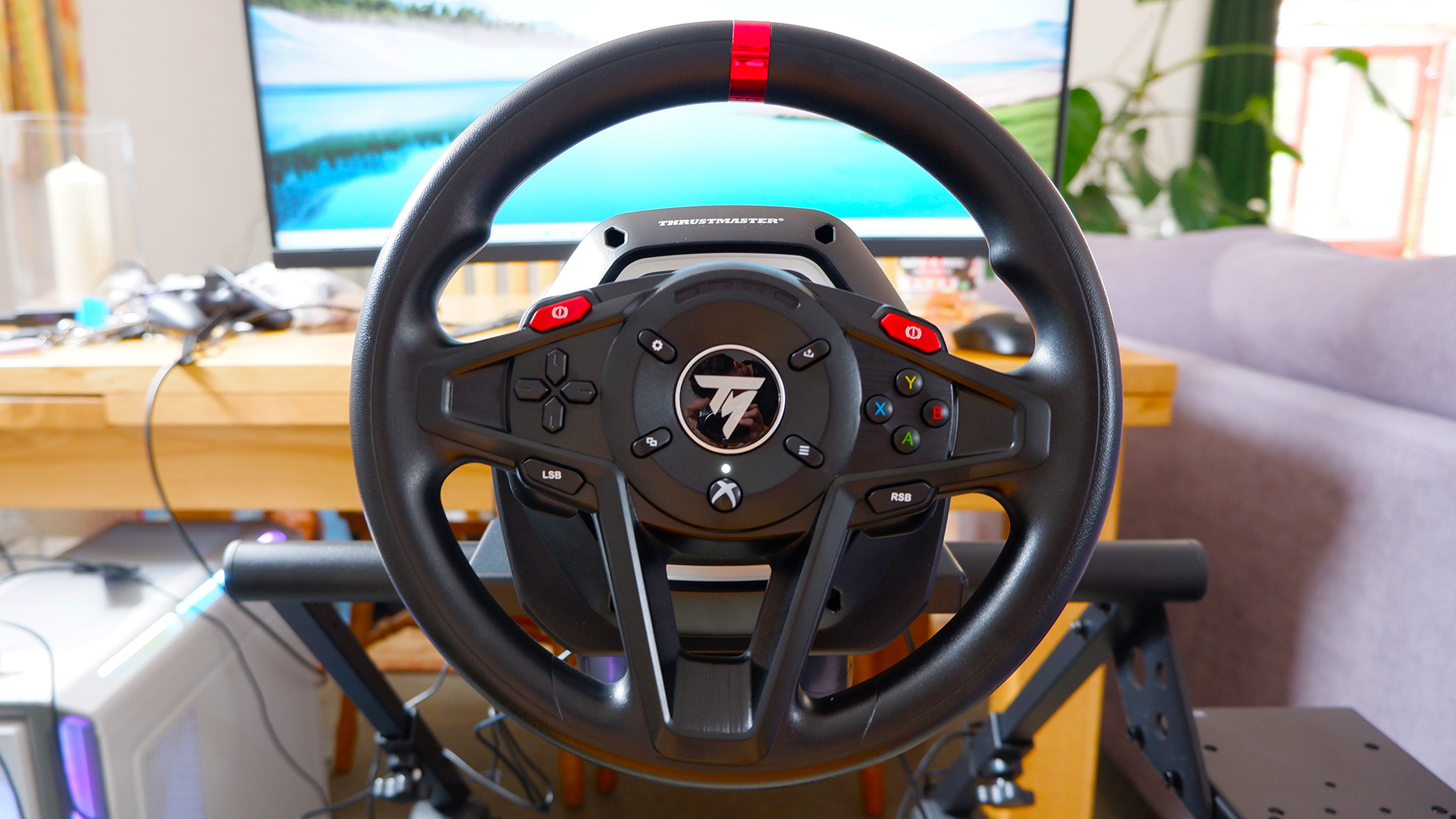
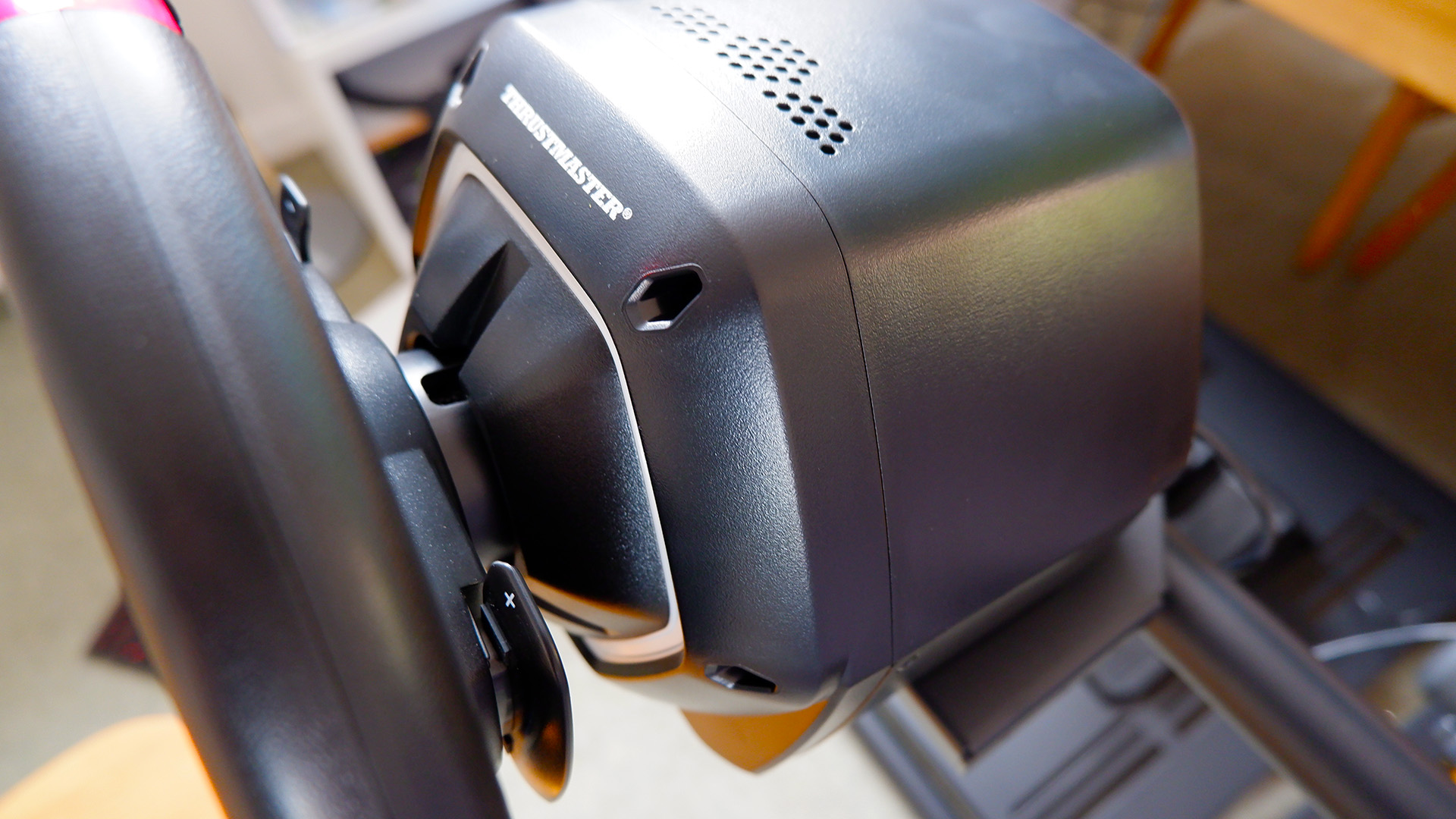
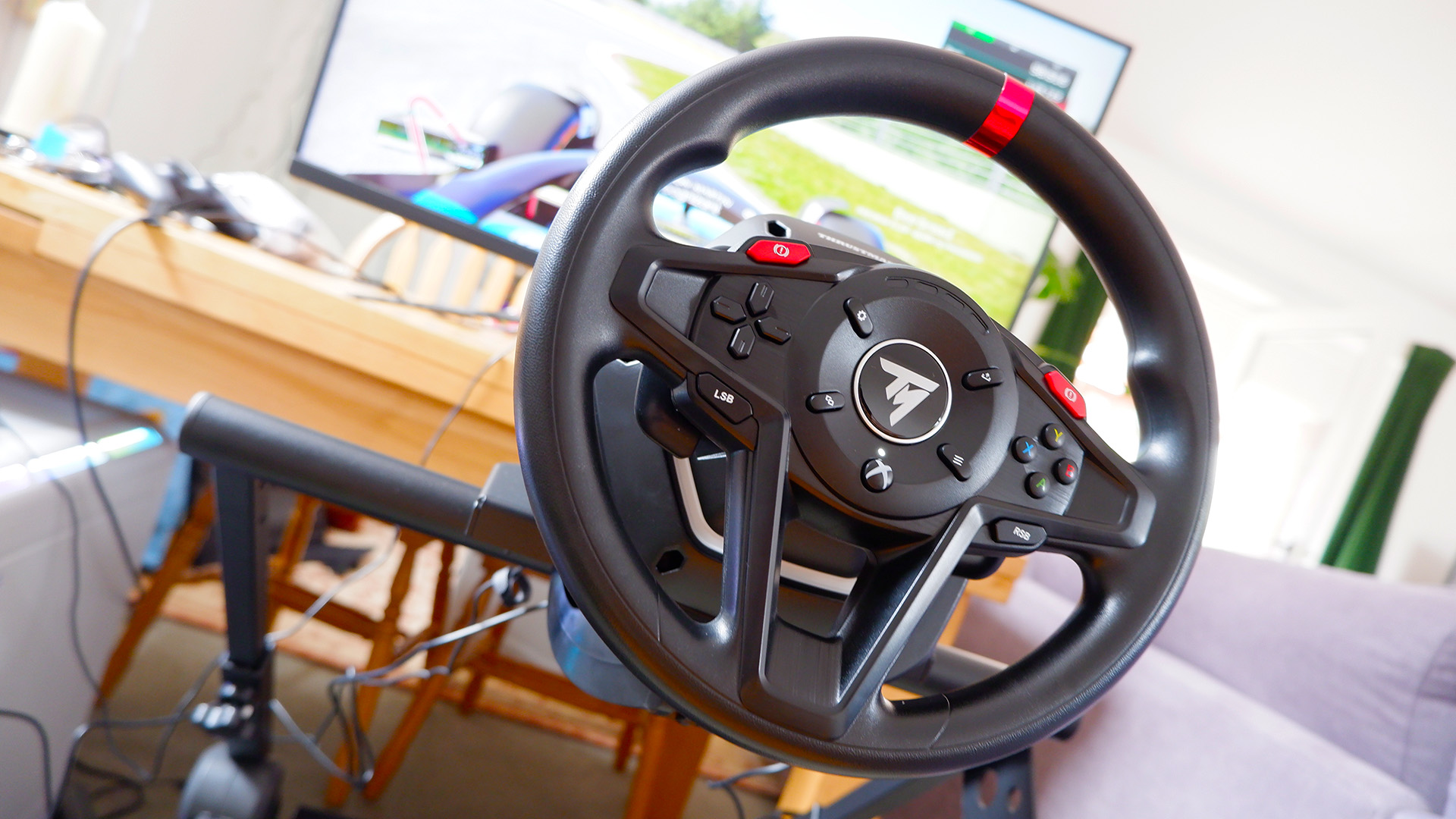
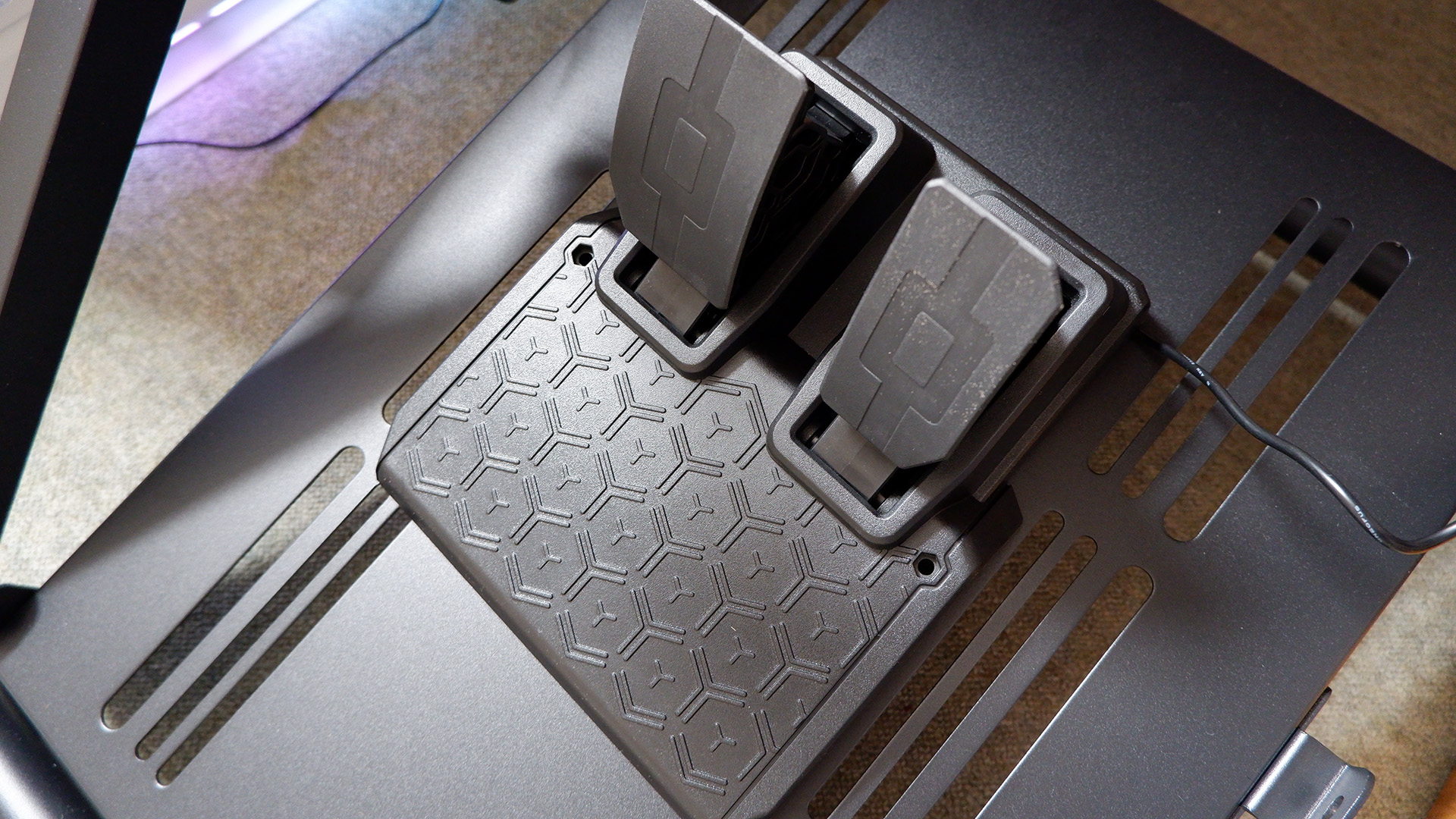
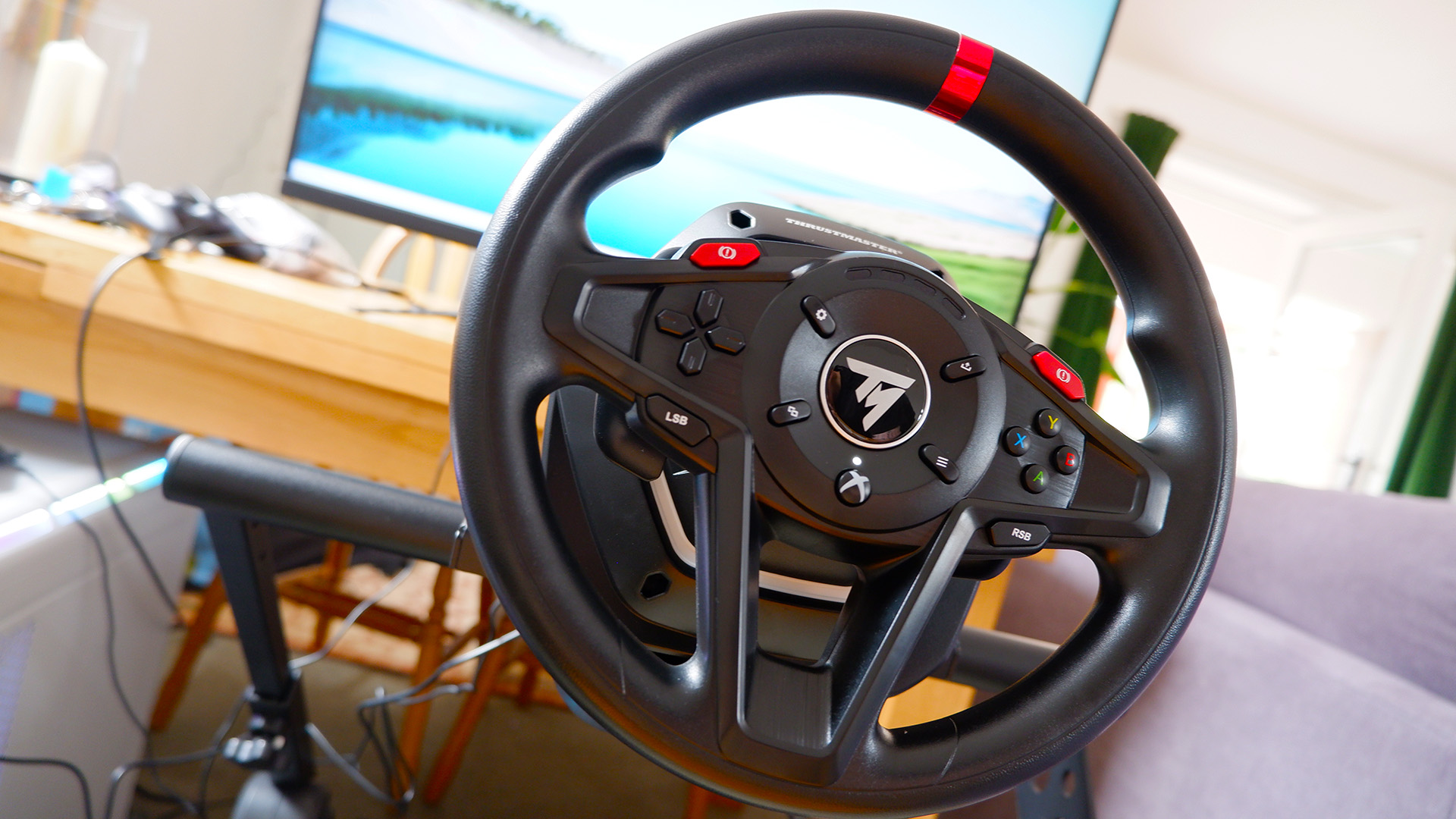
Specifications
Reasons to buy
Reasons to avoid
✅ If you want great feedback without the heavy price: Okay, so the T248 isn't a fancy direct drive model, but its hybrid drive system really does feel great to use and is plenty responsive.
✅ If you want great entry-level paddle shifters: There are better if you're prepared to spend up, but the paddles here are actually very usable and quick to respond.
❌ If you want great pedals: The pedal set is very plasticky and light, which gives it a tendency to move around, and the screw holes didn't line up on our test rig.
❌ If you want a premium feel: It's not necessarily a bad-feeling wheel, especially for the money, but the plastics leave a lot to be desired.
The Thrustmaster T128 is the best budget racing wheel to buy right now. Our previous pick for the best budget racing wheel was the Thrustmaster TMX Force Feedback, but the T128 is an improvement in every way on that aged design.
The key to the T128's success is that it shares the same Hybrid Drive system as found in the Thrustmaster T248. This drive is a combination of both gear and belt-driven force feedback, and while Thrustmaster has toned down the power on the T128 drive versus the T248, it's still noted as being 20% more powerful than the TMX.
My first impressions were that the hybrid drive on the T128 is incredibly smooth, unlike purely geared systems, which often feel clunkier. It doesn't come close to some of the best racing wheels in terms of power, but I'm genuinely impressed by its grunt considering its size. You'll definitely notice if you hit a curb.
Resistance feels great throughout the wheel as you turn it, too, which makes it plenty accurate for driving and developing your skills around a particular track. Cornering adjustments feel precise, especially compared to a gear-driven setup. The hybrid system is a huge improvement over gear systems, for sure.
However—and this is no surprise given the cheap cost—the T128 feels a little cheap. It doesn't have any grip around the wheel, and the wheel is non-removable. The buttons are made of a very cheap-feeling plastic, too. It will probably last, but it will also likely show some wear and tear with time quicker than more premium options. This lack of grip isn't wonderful for sweaty palms, either.
The T128's pedals are also pretty poorly thought-out. The T2PM twin-pedal set may be included, but it doesn't feel fantastic under your feet: lightweight, plasticky, and prone to moving around a lot.
The T3PM pedals are $100, and these are much better. This is half the price of the entire T128 kit, so I can see why Thrustmaster hasn't gone for something better in this price bracket. But those of you looking to upgrade in the future will want to start with the pedals first, as they're the most obvious way to improve your immersion, and very likely your lap times too.
Otherwise, the T128 is a genuinely brilliant entry-level racing wheel. It's decently powerful, smooth, and a good way to break into sim racing without spending a whole heap of cash.
Read our full Thrustmaster T128 review.
Best mid-range racing wheel
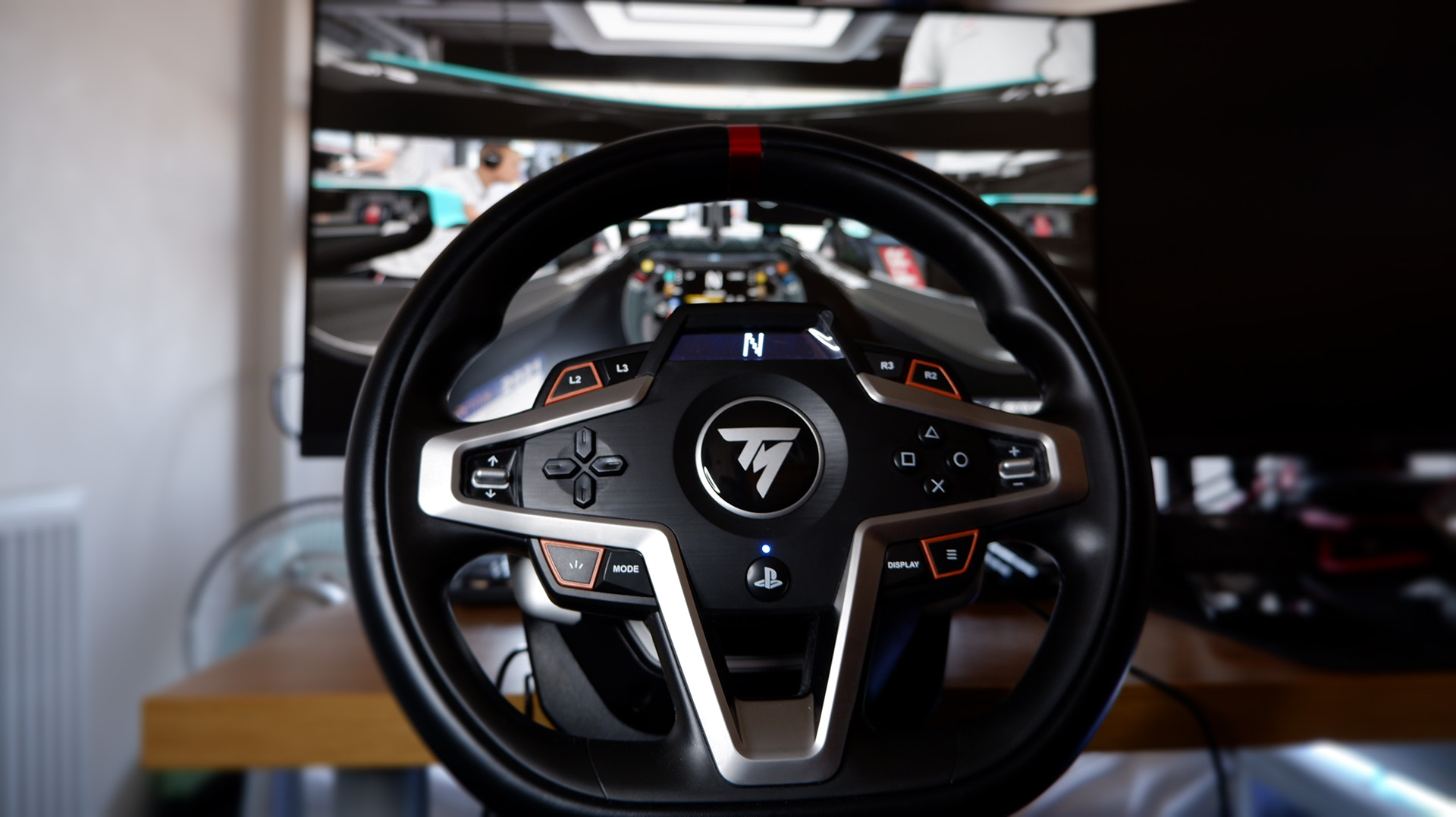
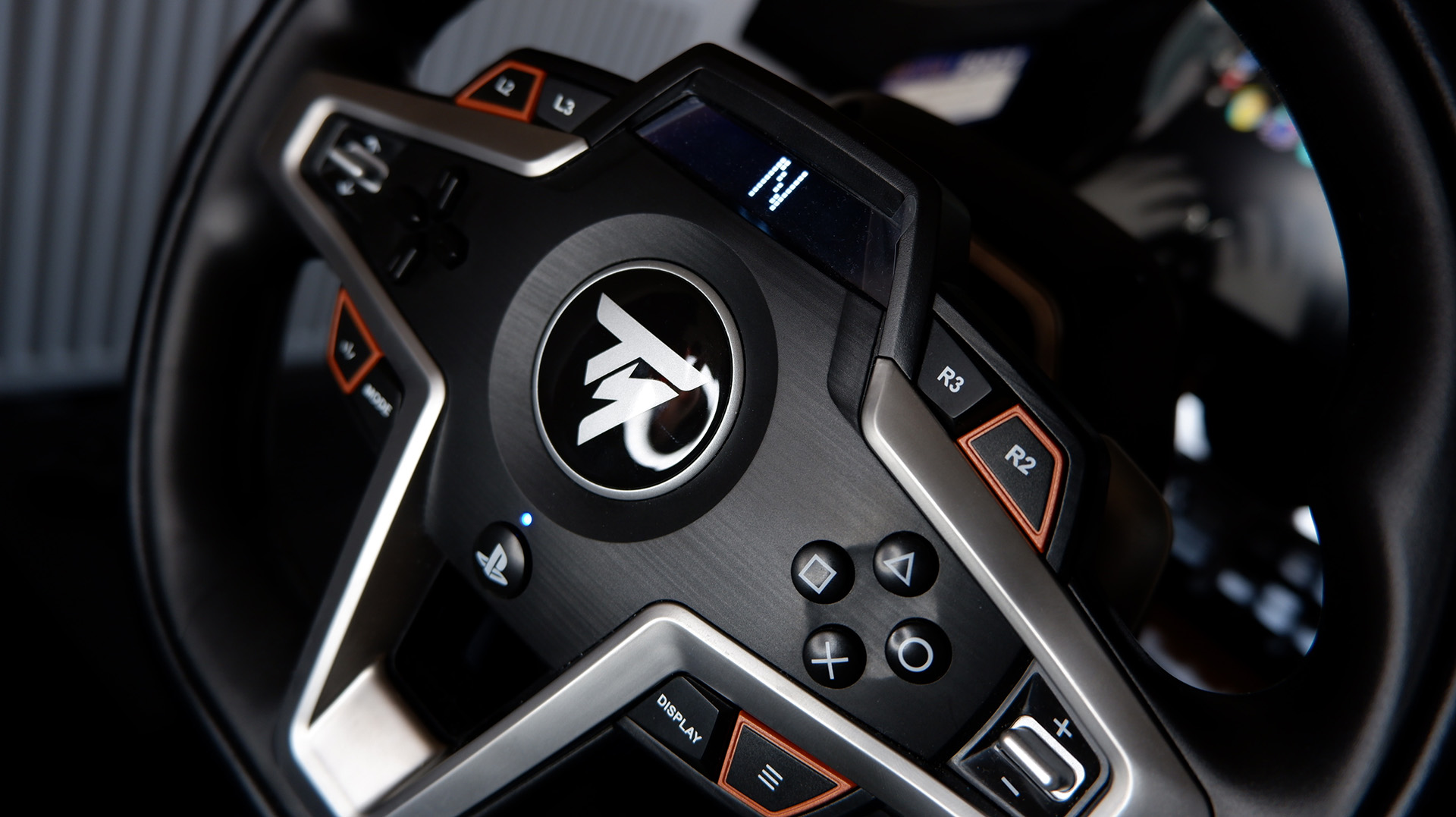
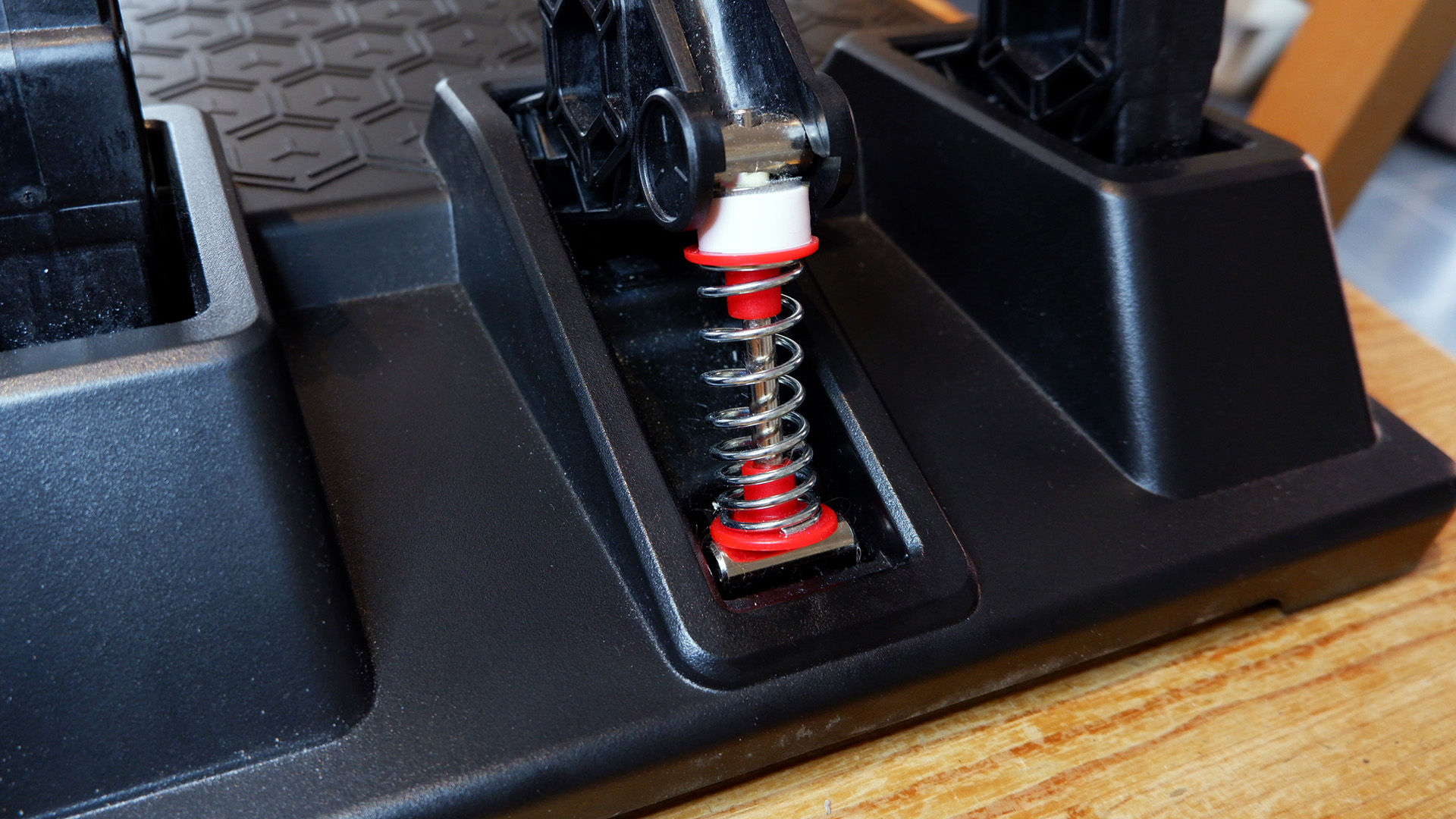
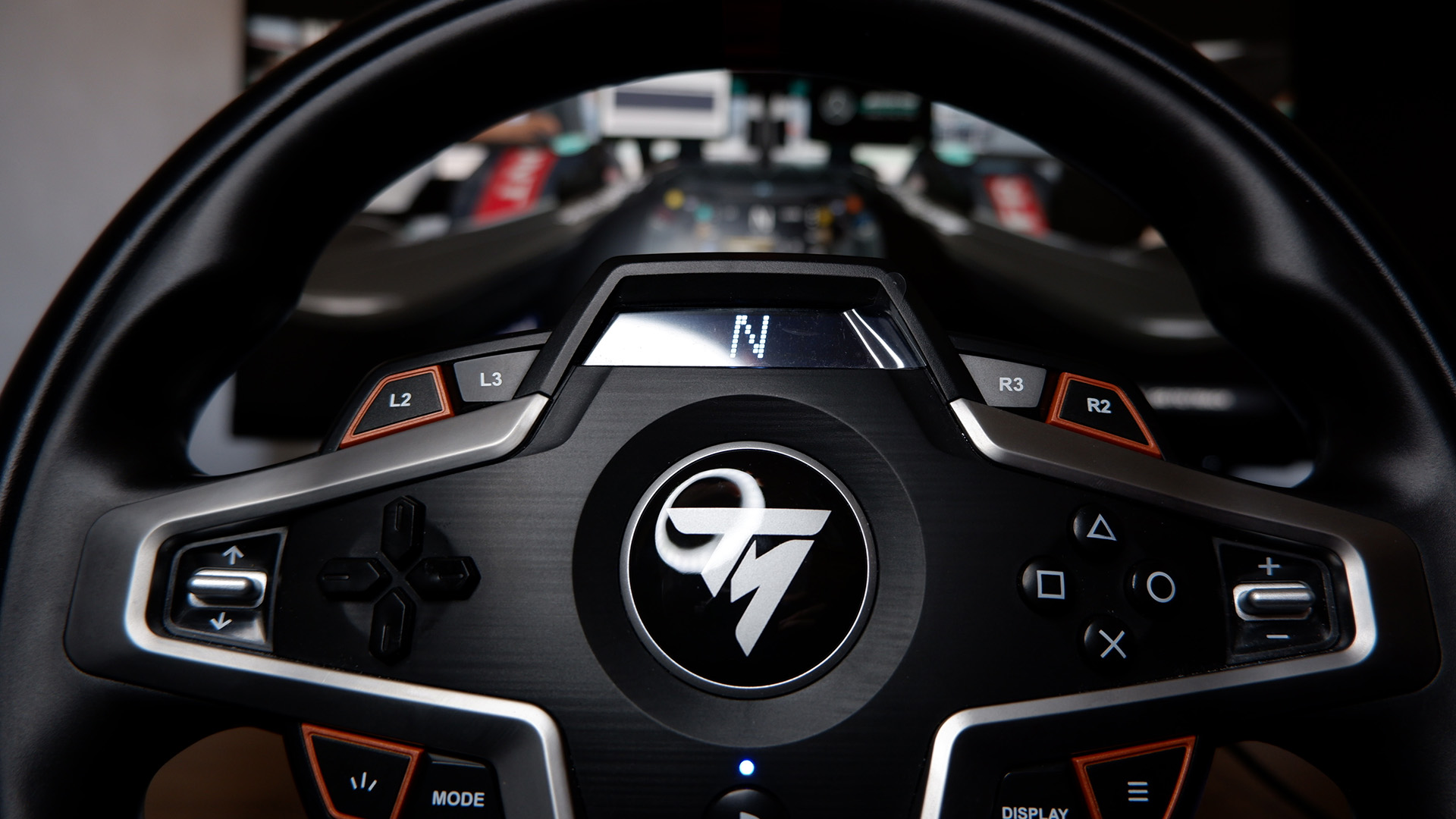
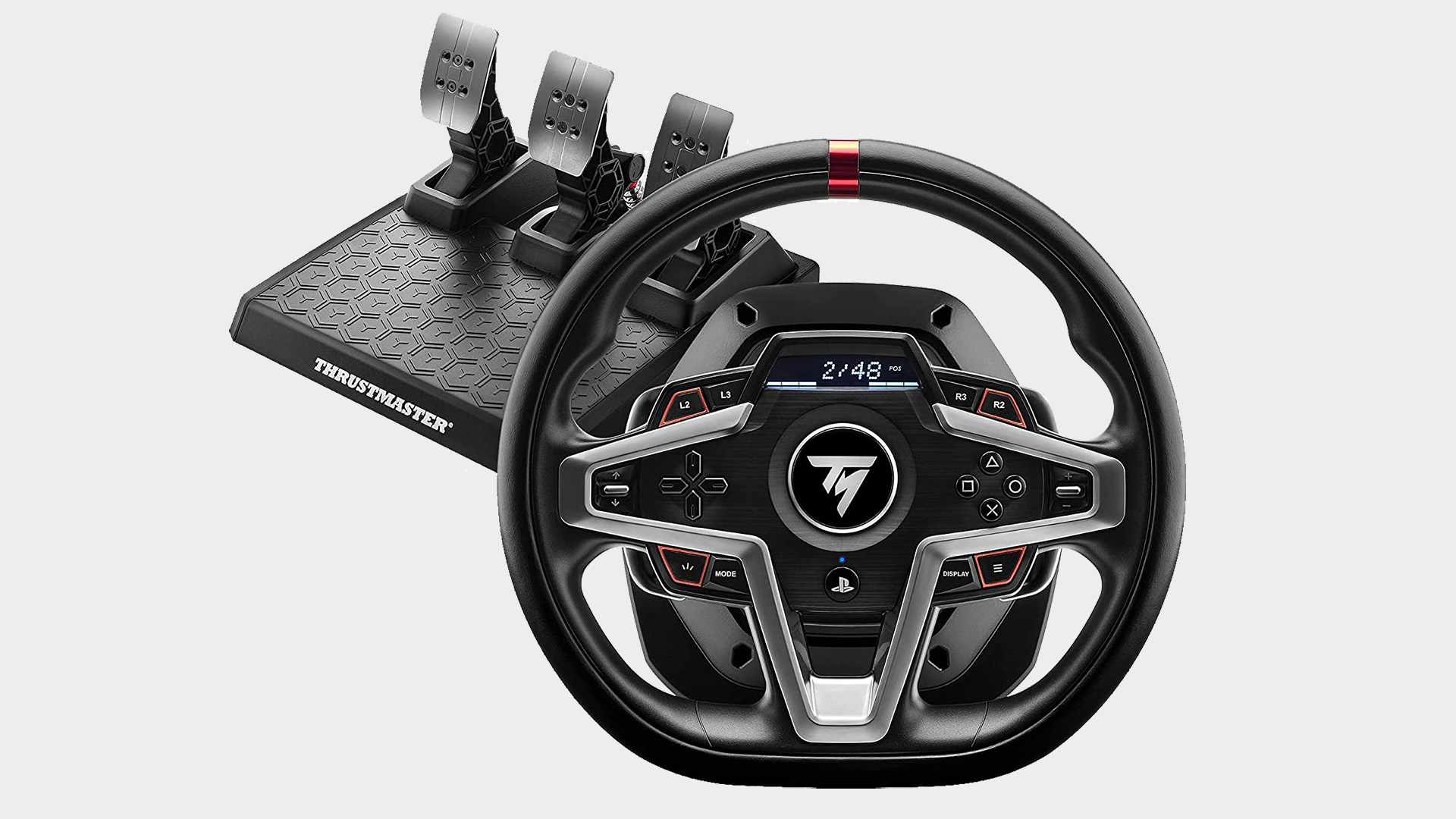
Specifications
Reasons to buy
Reasons to avoid
✅ If you want accuracy from a hybrid system: The T248 can deliver a surprising amount of resistance, which makes it great for accurate driving.
✅ If you're looking for good pedals: While the units included here won't compete with proper standalone pedals, all the basics are covered with a decent brake system.
❌ If you want to loosen up: While the heavy resistance settings are good for things like F1 games and Forza Motorsport, drift and rally fans may prefer something they can throw around more easily.
❌ If you don't want to wake your housemates: The magnetic shifters on the wheel feel great, but they're very, very loud.
The Thrustmaster T248 is a far more budget-friendly option than even the cheapest direct drive wheel, and our pick for the best mid-range racing wheel right now. The force feedback it delivers is a lot more impressive than you might expect, and it's exceptionally accurate.
Inside the T248, you'll find a hybrid force feedback system that utilizes a gear alongside a belt. That covers the downsides of the geared system, which has been known to feel clunky at times but still has all the benefits of a belt system. Plus, that keeps it cheap.
The Hybrid Drive feels like a smart move on Thrustmaster's behalf once you get this wheel set up, too; as compared to a purely gear-driven motor, there's a lot of power and response delivered through the wheel while racing.
However, the T248's hybrid system has appeared to come at the expense of some of the finer touches. The build looks and feels cheap. Similarly, it's awfully loud, especially the shifter paddles. These are, however, incredibly responsive. A worthy trade-off? Yes, so long as you don't need to keep the noise down too much.
It is quite a heavy-feeling wheel, though, and you have to really work at it with some force to turn a sharp corner at high speed. If you don't have it set up right for some cars in Assetto Corsa: Competizione—where the wheel rotation is much smaller—it can be a bit of a struggle to turn the T248 as needed. However, you can make things a little easier on yourself by spending some more time tweaking the settings.
Compared to direct drive units like the Fanatec GT DD Pro, you're looking at a much weaker response in the T248, despite this heavy resistance. It can come across as a little muted when you're throwing it around rocky terrain. Yet there's not much out there for this kind of cash that will appeal to more casual gamers and more experienced racers than the T248. Perhaps the T300RS—with its hot-swappable wheel and belt-driven force feedback—but then you're missing out on some of the mod cons of the T248, and that great pedal set.
The T248 gets a lot technically correct, and when it comes down to it, I'd take technical precision over aesthetics any day. This is the best wheel to buy on a tighter budget if you want to develop your racing ability and learn to corner consistently.
Read our full Thrustmaster T248 review.
Best budget direct drive racing wheel
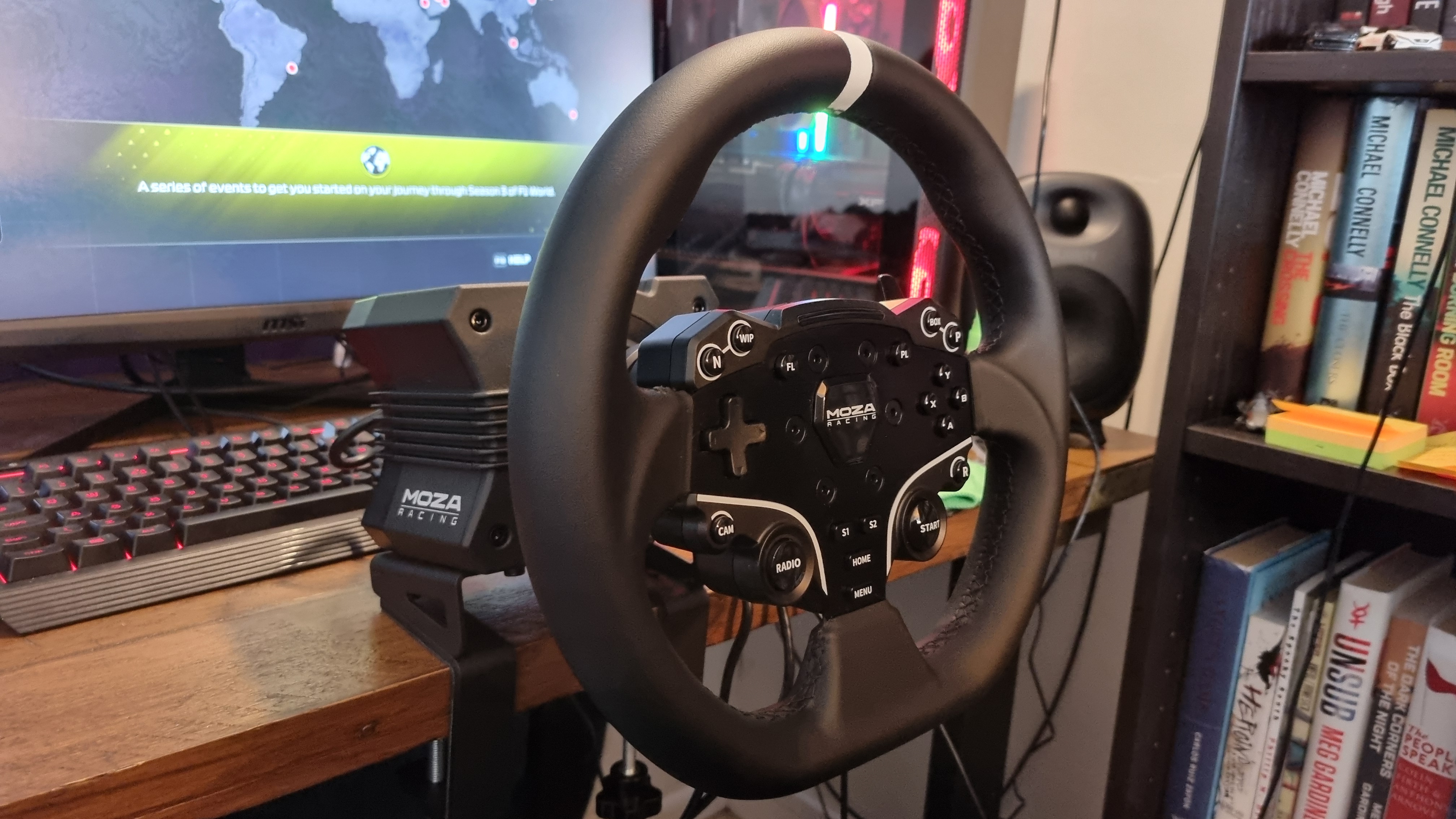
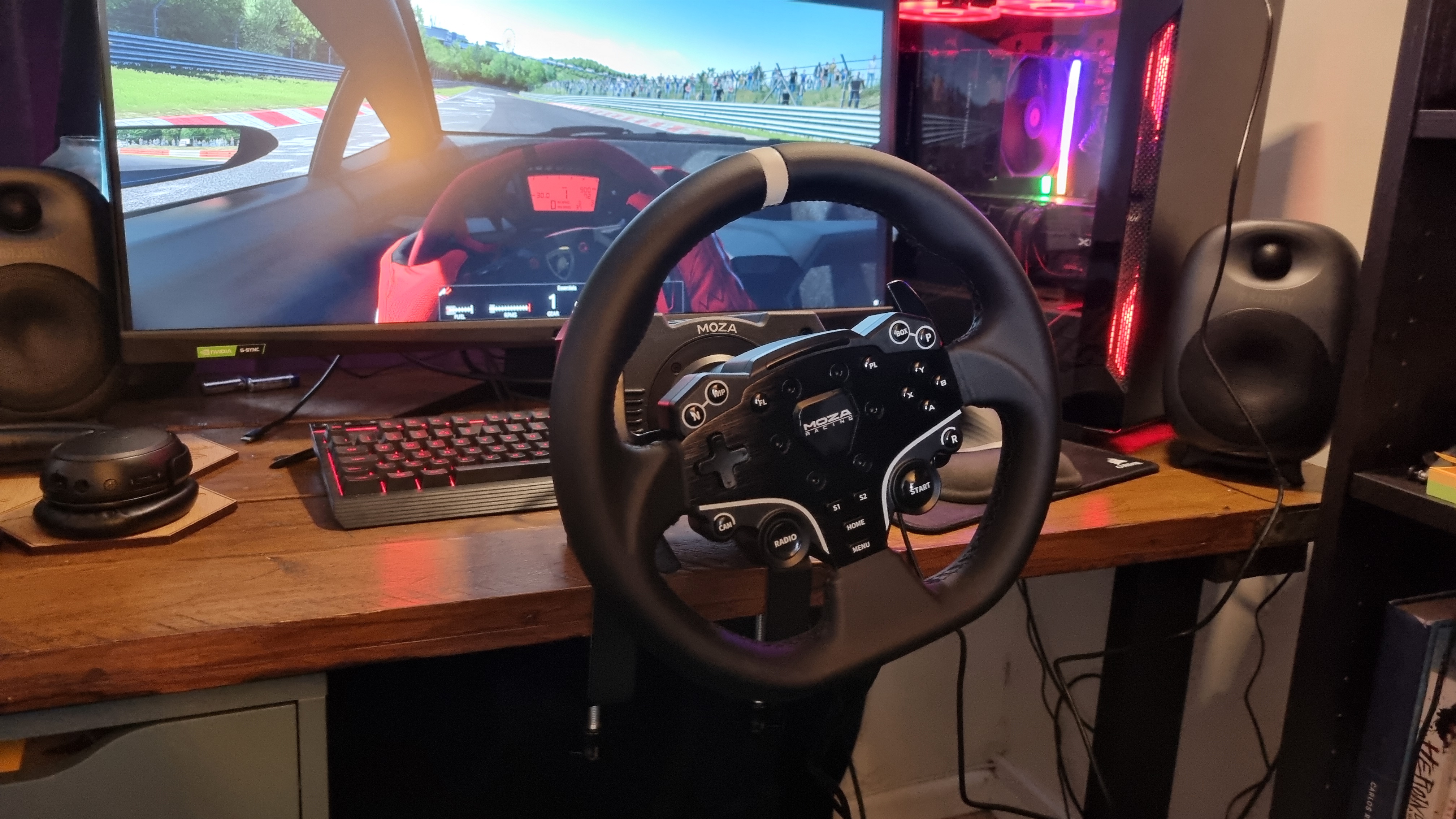
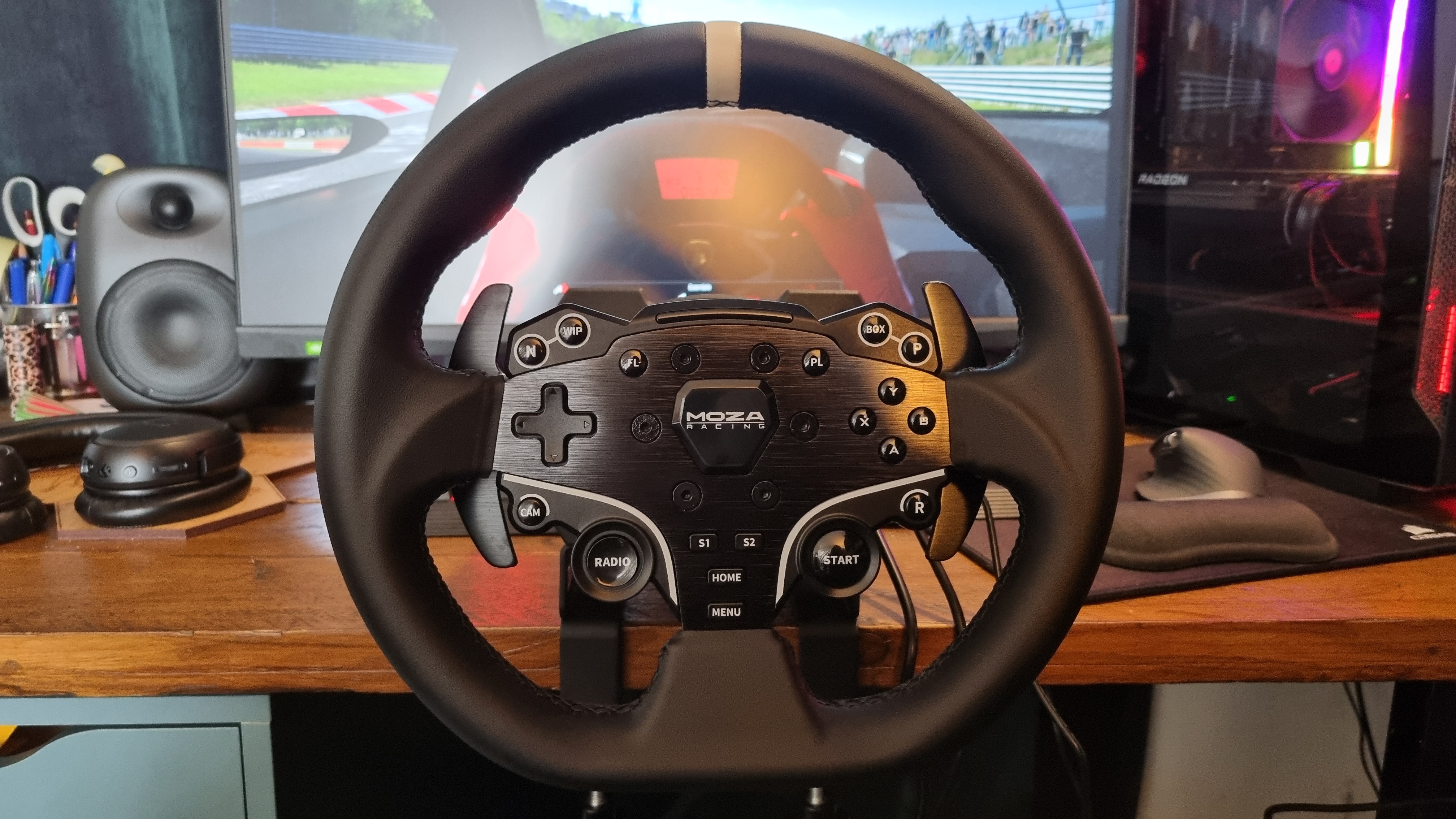
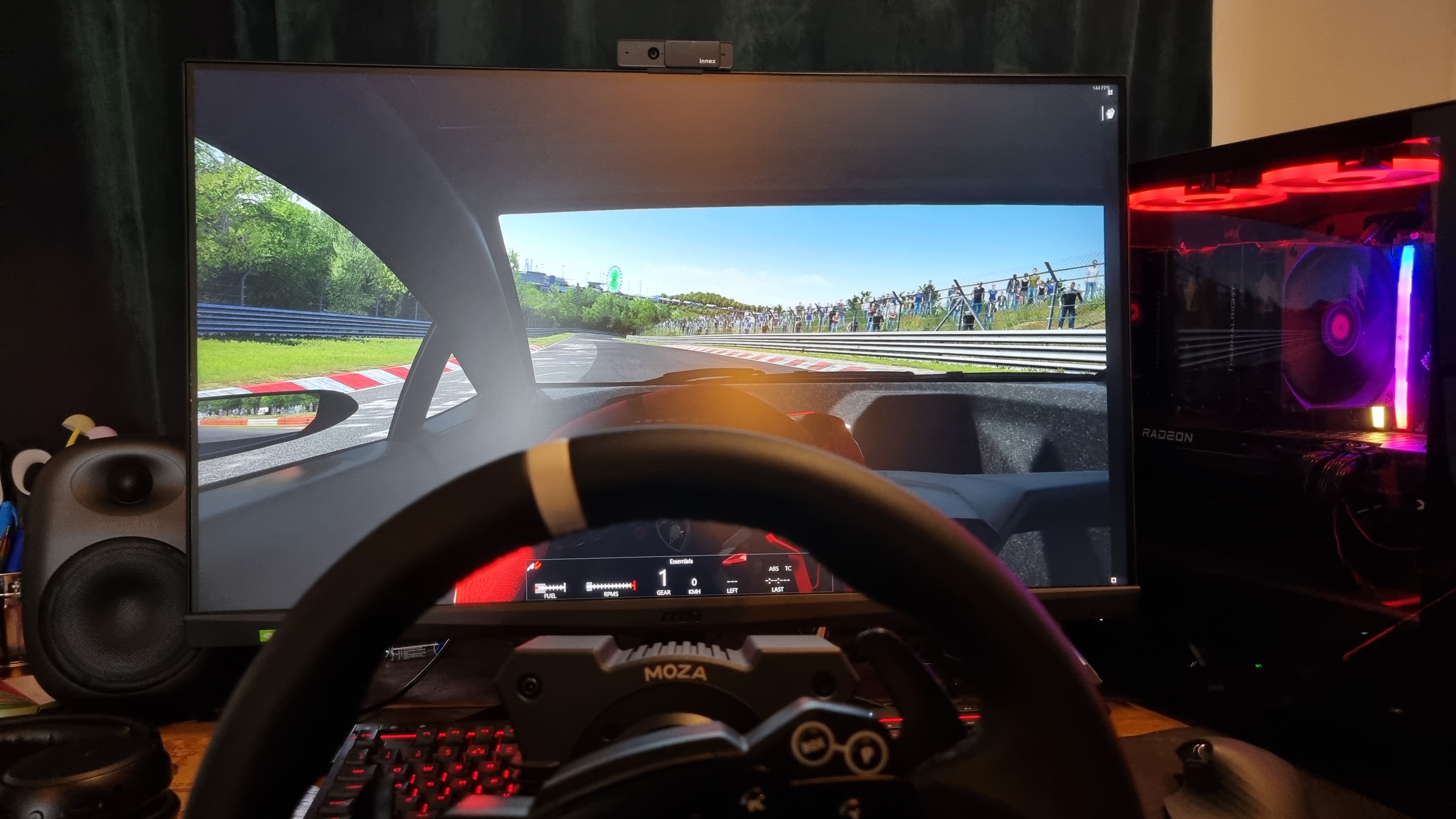
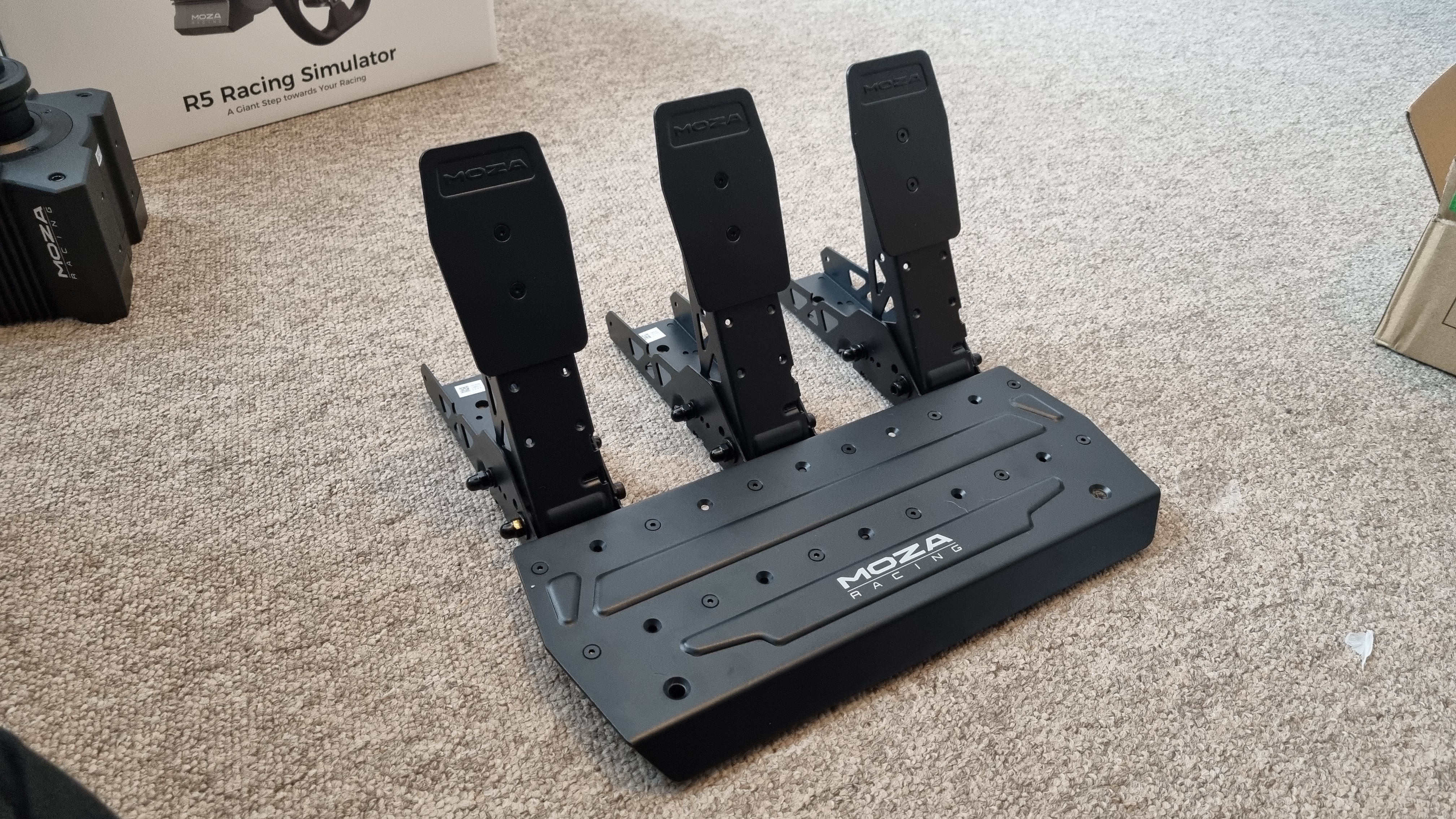
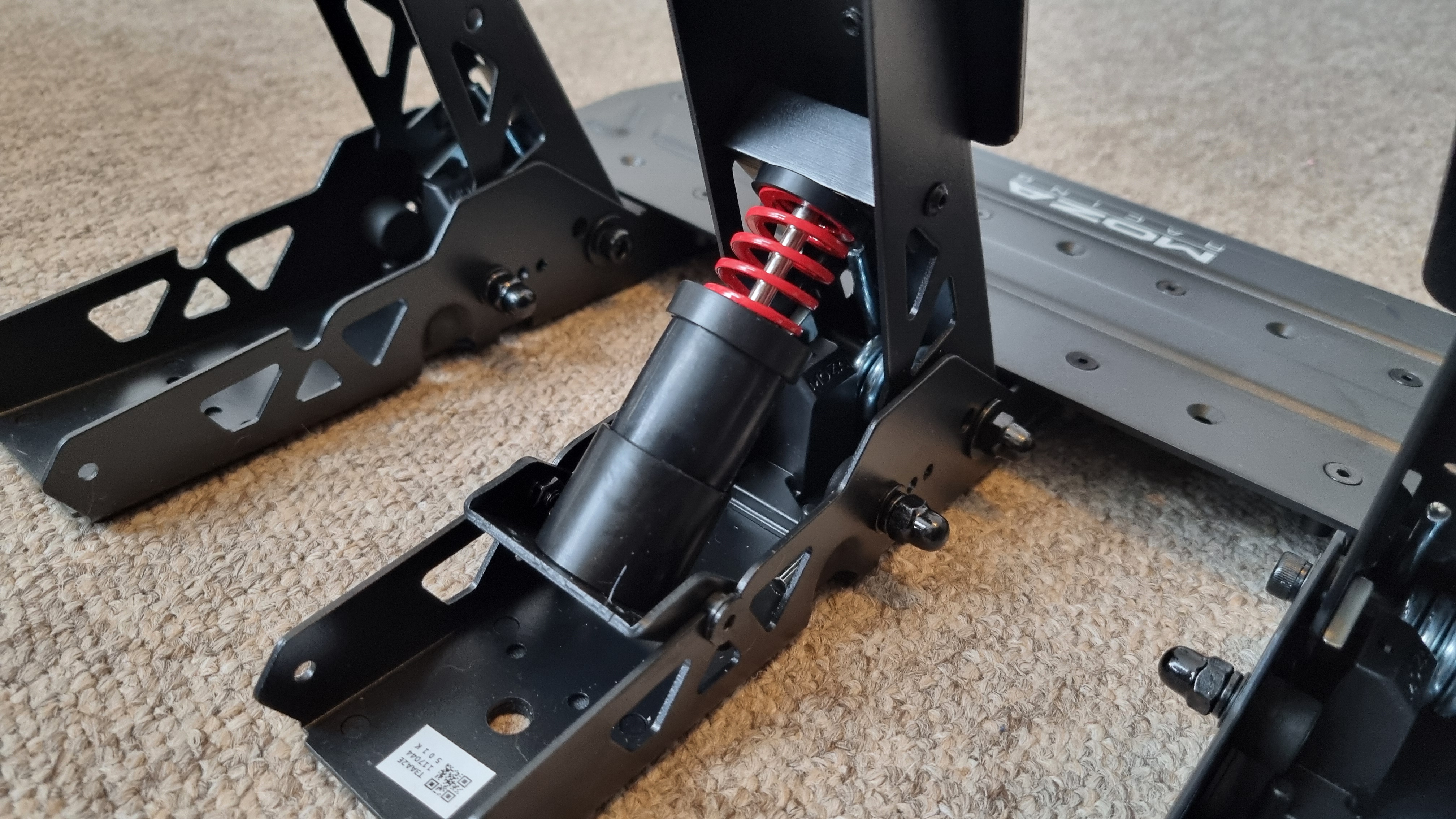
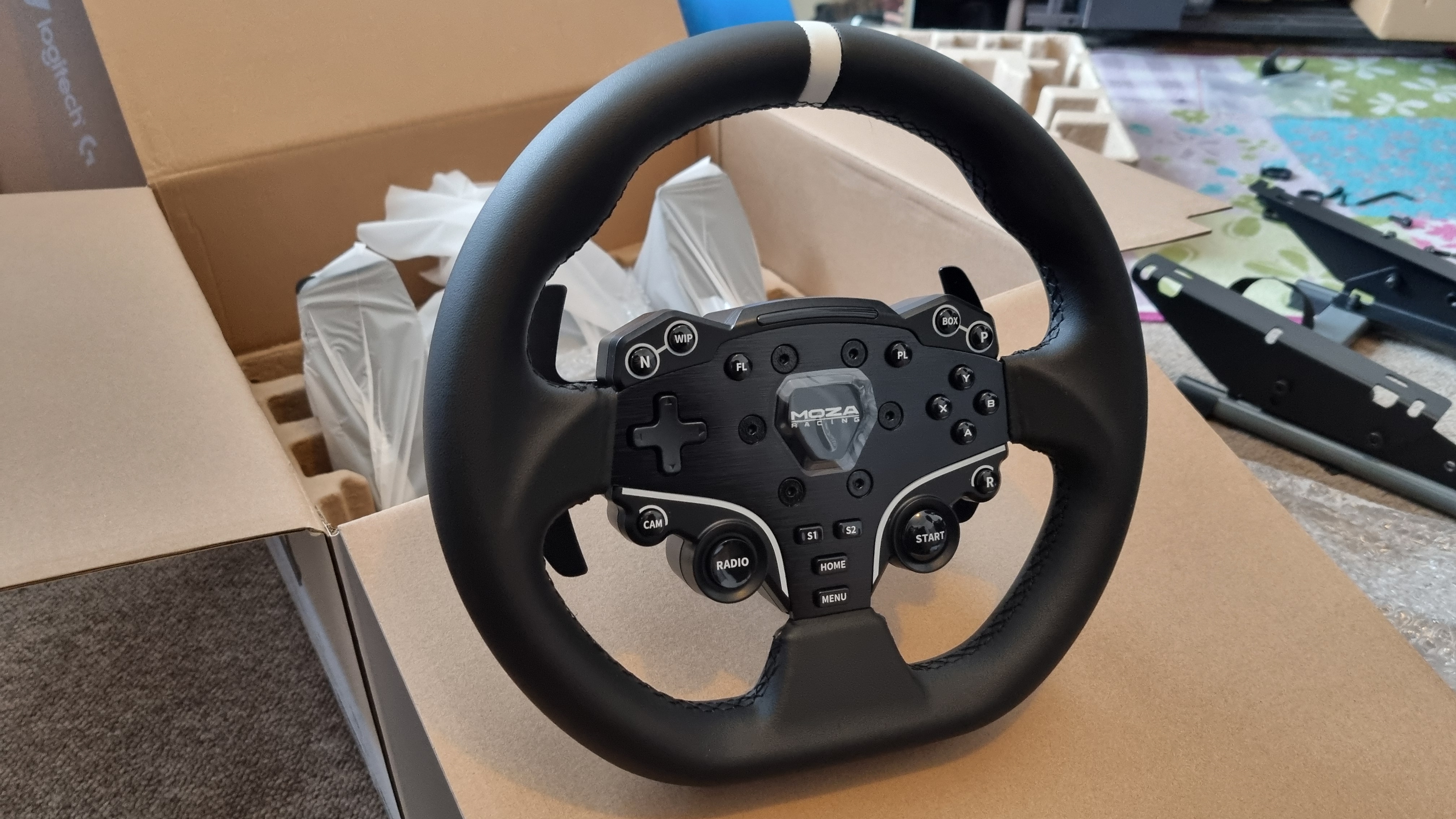
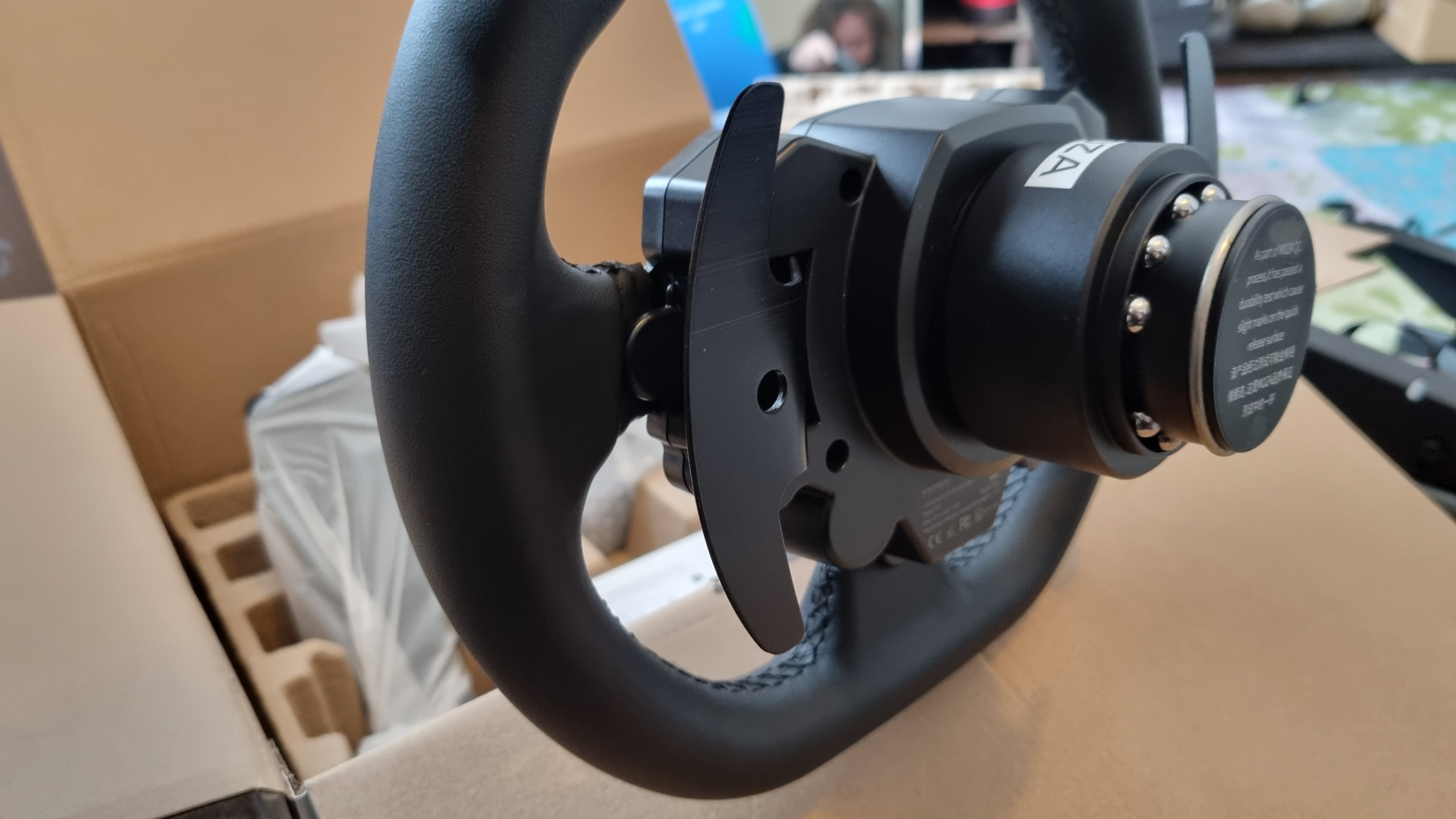
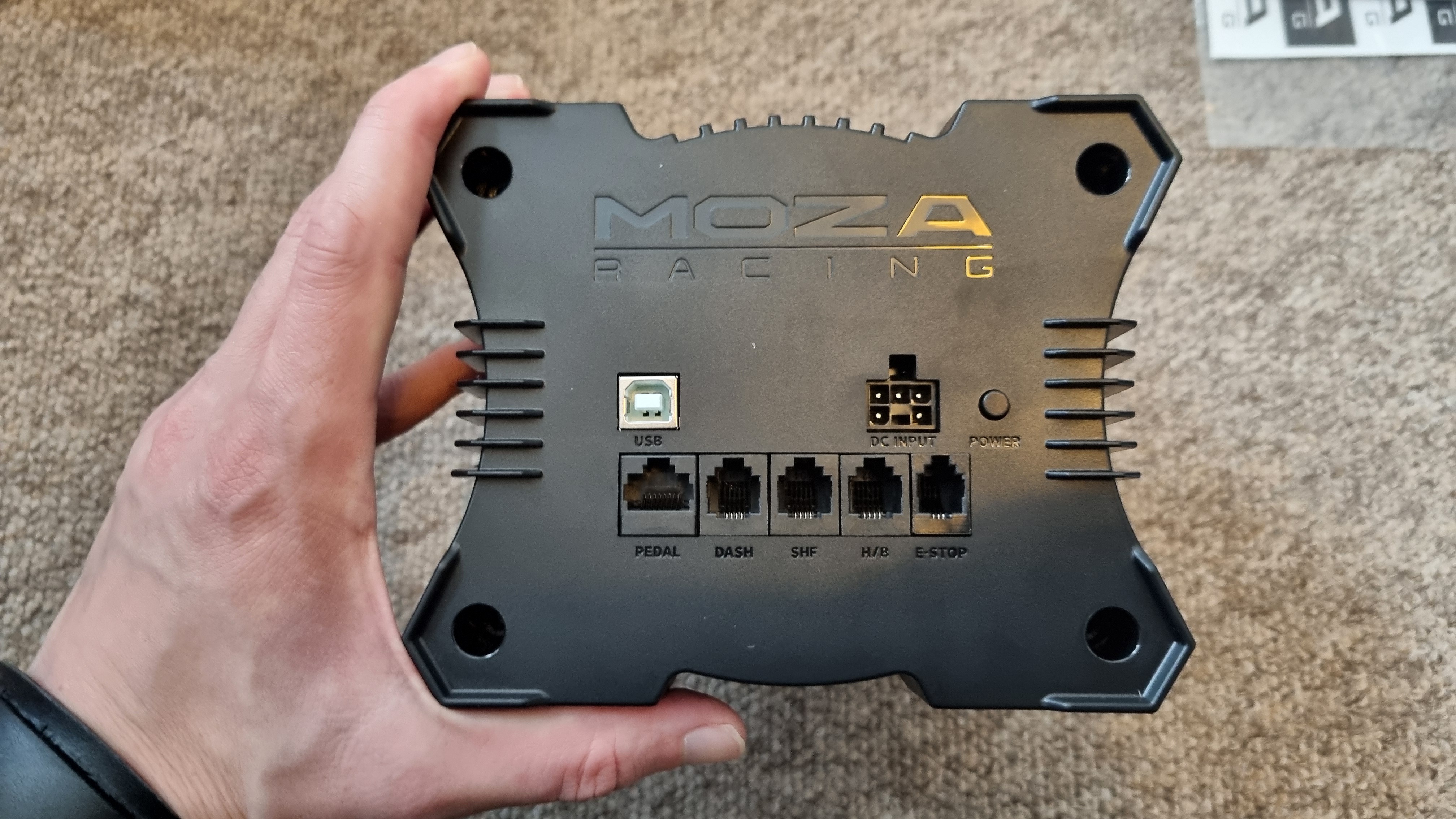
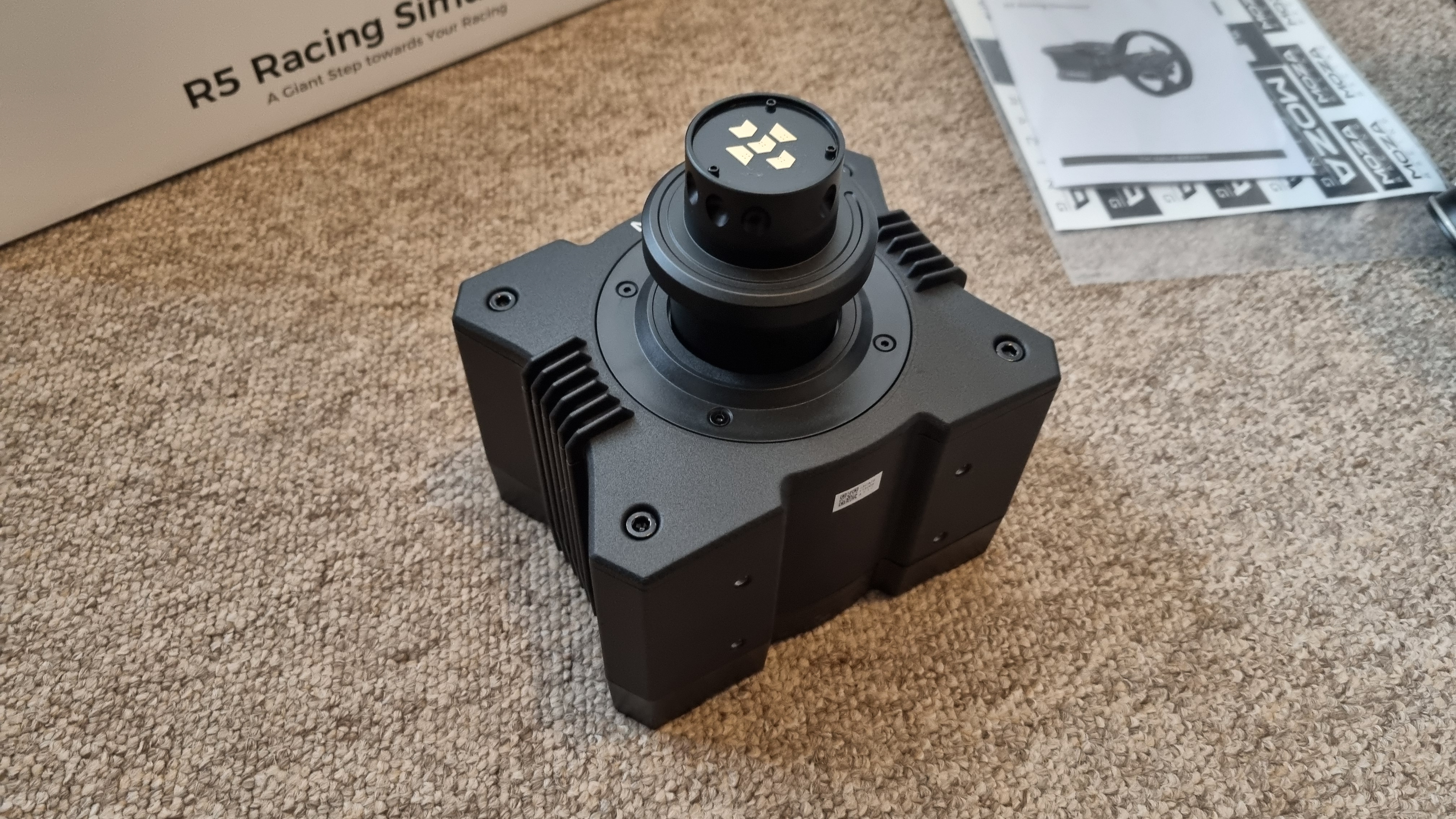
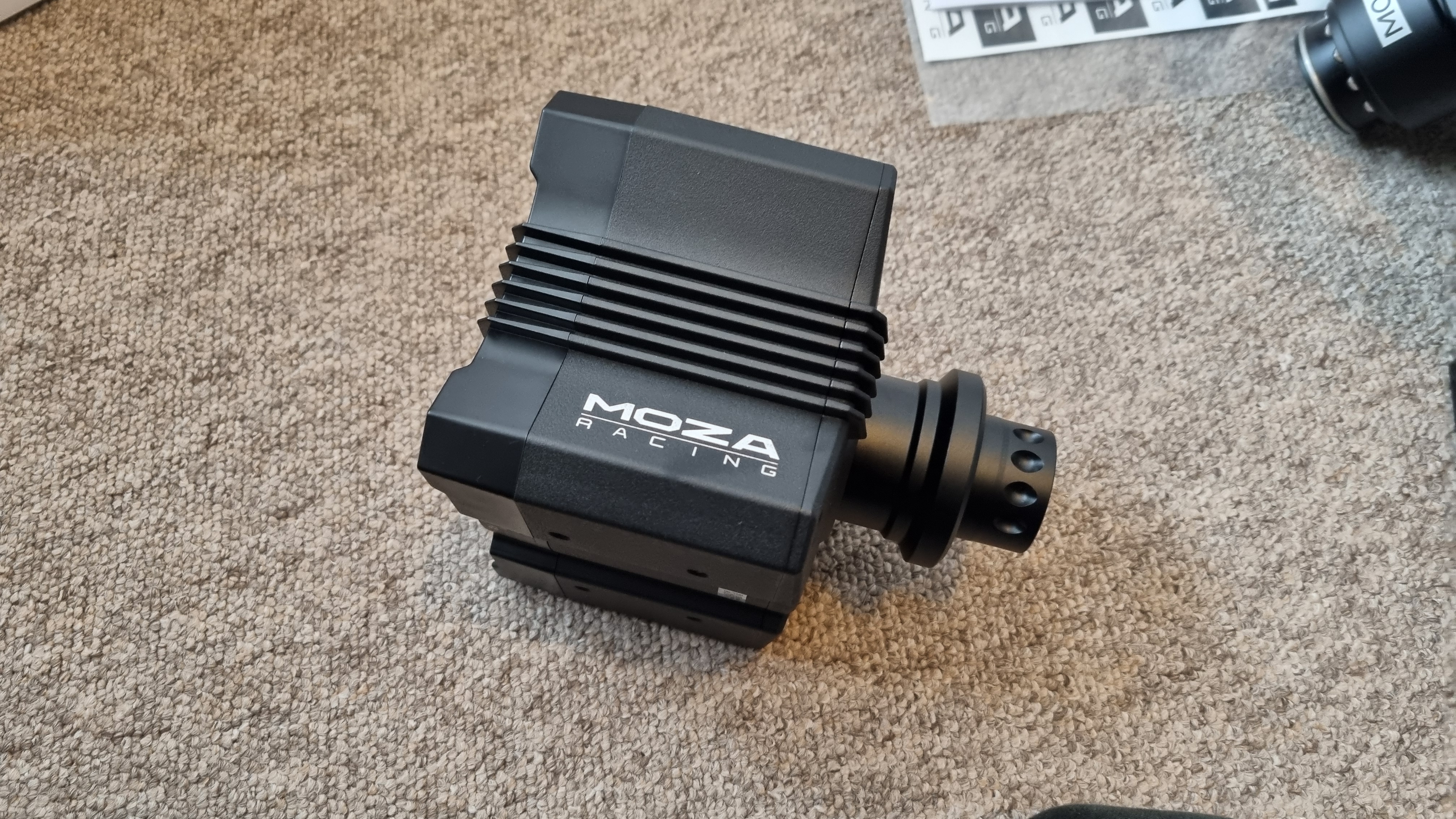
Specifications
Reasons to buy
Reasons to avoid
✅ You want proper direct drive for less: Despite its more budget-friendly price tag, you can still score a wheelbase that really kicks, with superbly detailed, realistic feedback.
✅ You want a quality, robust setup: From the wheel rim to the all-metal pedal set, the Moza delivers a level of quality that's genuinely surprising for such a well-priced bit of gear.
❌ You want lots of kick behind the force feedback: At just 5 Nm, the Moza R5 isn't anywhere close to the power of the Logitech G Pro Racing Wheel. It's still got a fair bit of grunt, though, and should be plenty for most.
The best budget direct drive racing wheel is the Moza R5 bundle, due to its surprisingly affordable price tag, tough construction, and detailed, punchy response. Considering it's quite a bit cheaper than the Fanatec CSL DD, that's a big win.
The Moza is also pretty upgradeable. It might not be a match for the many upgrade options available on the Fanatec, but you can grab a load-cell brake kit upgrade for its all-metal pedal set for just $29. For that sort of cash, it'd be silly not to get one, as it improves the brake pedal experience immensely.
The Moza R5 is a surprisingly high-quality piece of gear that really sits at odds with its budget price point. The wheel rim in particular is cushy, padded, and robust, in a way that makes other budget racing wheels feel downright outclassed.
The paddles have a really satisfying clunk to them, which is more important than I've made that sound. Satisfying gear shifts make you feel more connected to your virtual car, and the Moza has them down to a fine art. The whole setup is a lovely thing to interact with and has stood up to some serious abuse over the past year or so with absolute aplomb.
While weaker than some, the Moza's motor can propel the wheel around plenty when it needs to. It takes some forearm strength to really throw it around for a long race distance. Plus, the finer details come ripping through the wheel, direct from the virtual road into your hands. It feels alive with the right car, and delivers a level of granularity and texture in the feedback that is worthy of much, much more expensive gear.
The only major issue we ran into during testing was with the mounting plate on the Playseat Challenge X, and the lack of lengthy bolts included with the Moza package left us having to take a trip to the hardware store (bits 'n' bobs shop for fellow Brits) to get suitable replacements.
Even with that small, bolt-related caveat, it really is quite astonishing how good the Moza is for the cash. While it remains quite hard to argue with the Fanatec as a buy-in to a massive eco-system of parts, Moza does offer plenty of options itself, and considering how much you can save with the R5, that's all money towards something else.
Maybe a sim racing frame to keep your pedals in place, or a Formula One-style wheel? Direct drive-powered sim racing can quickly become an obsession, and the Moza kit is well-placed to get you going for a very reasonable sum.
Read our full Moza R5 Bundle and Performance Kit review.
Most upgradeable racing wheel
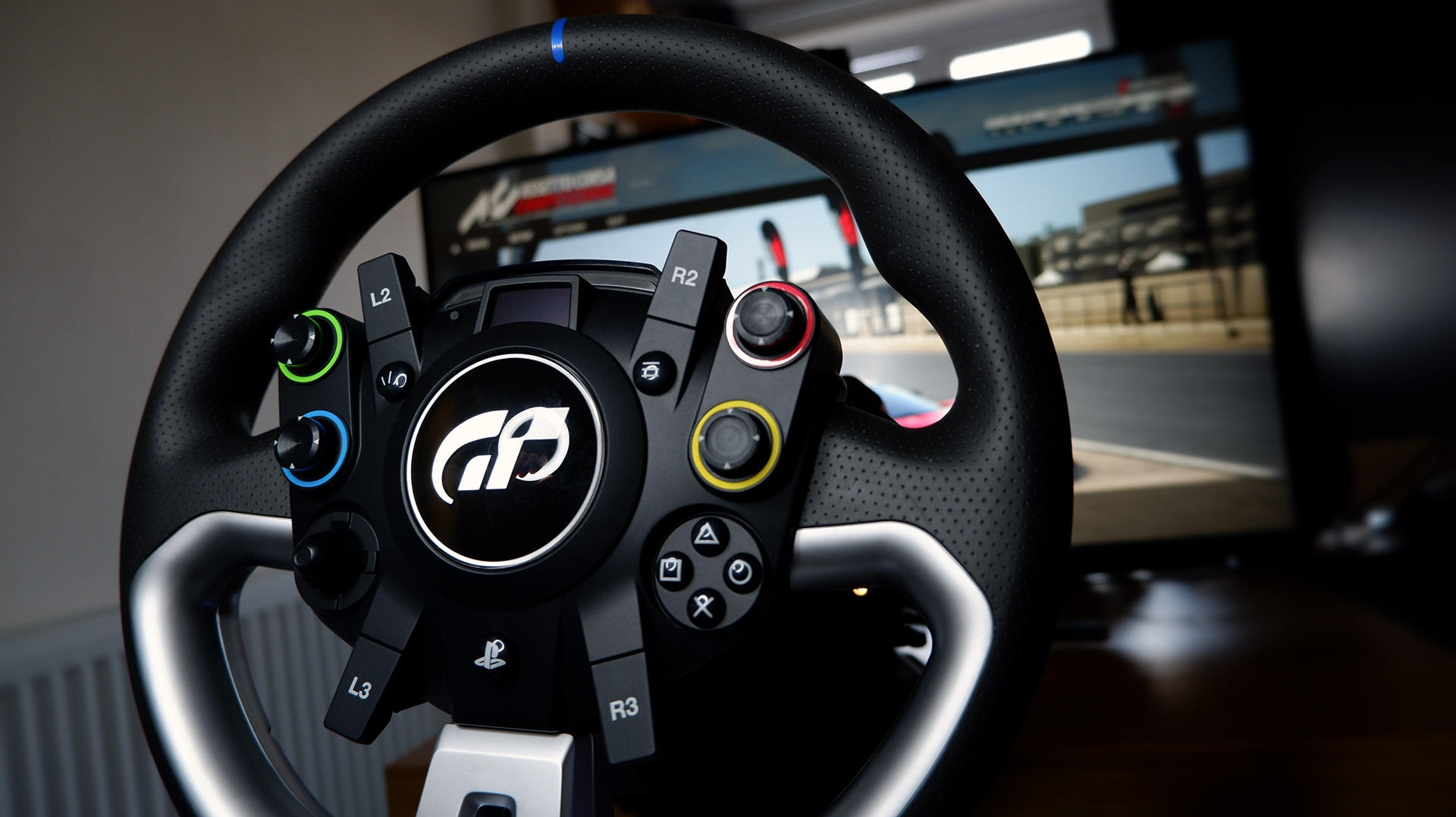
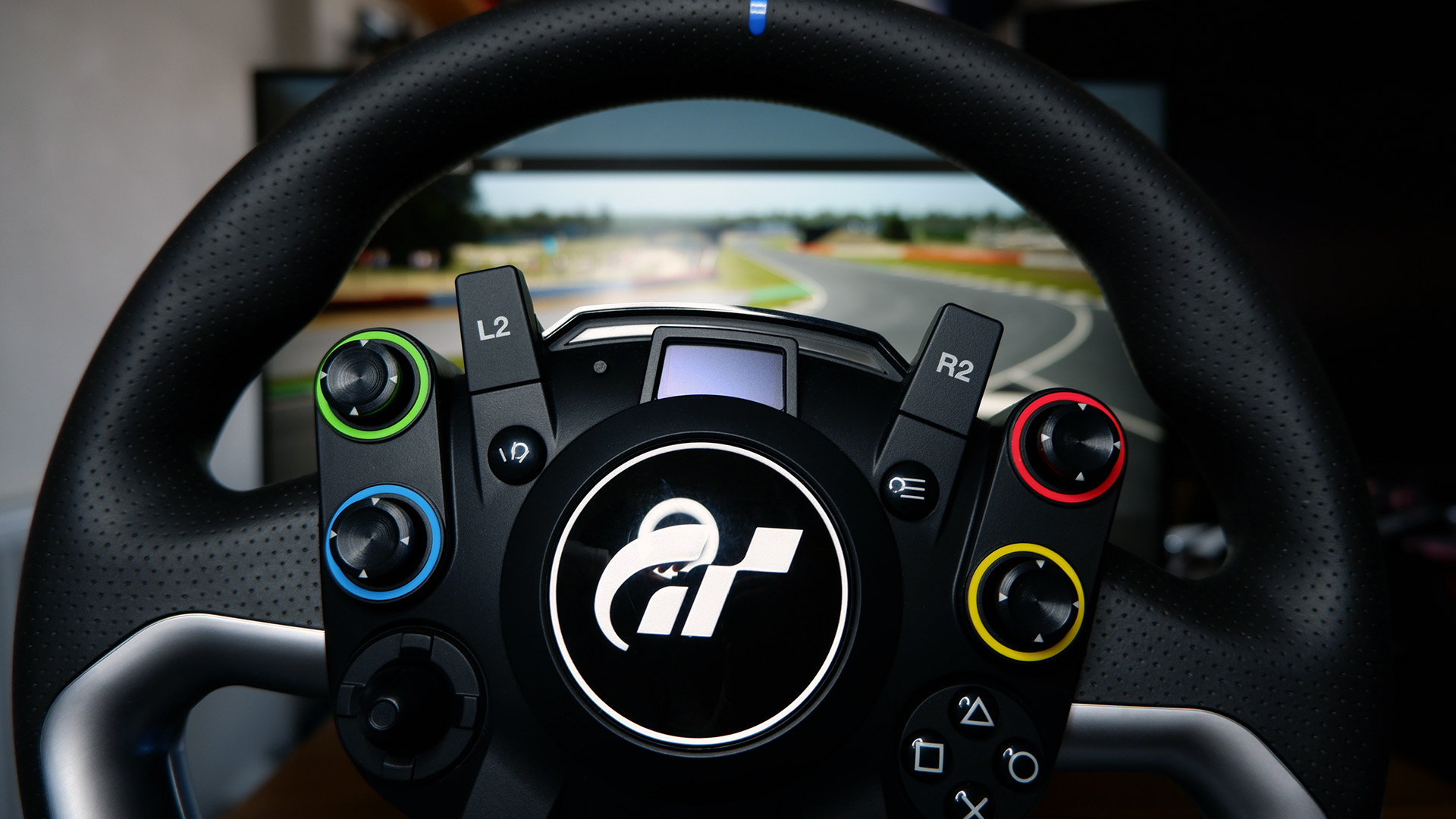
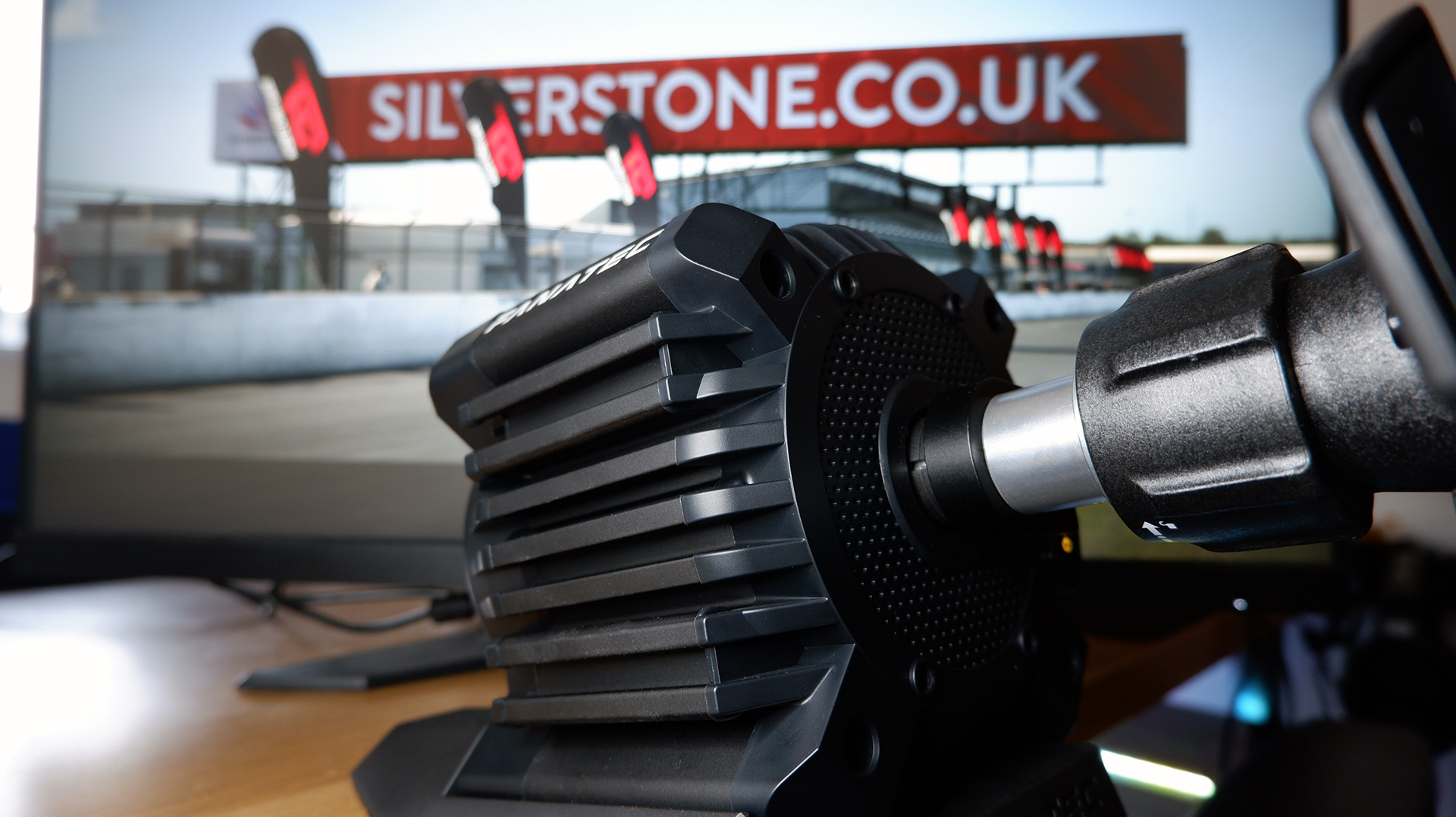
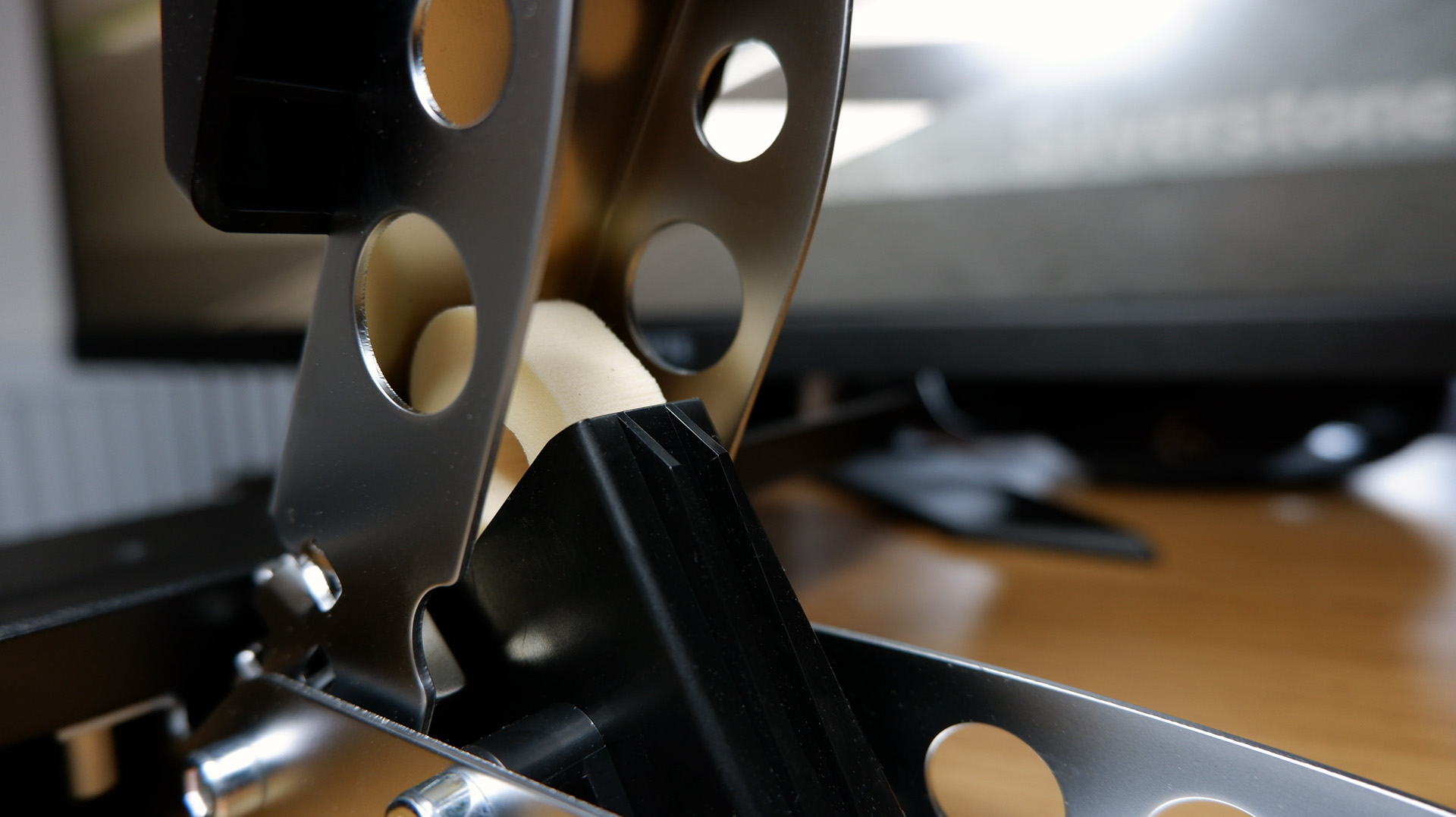
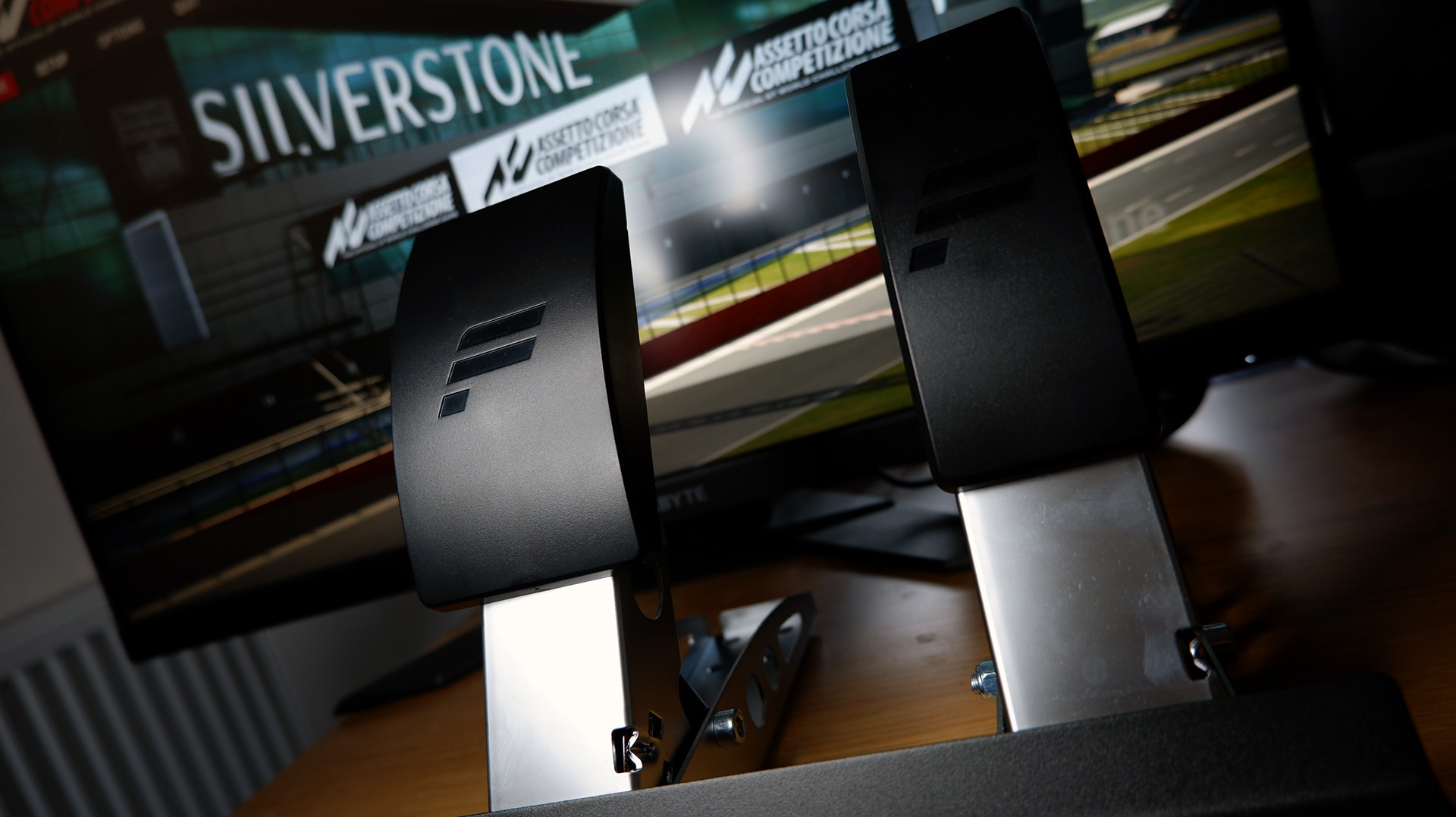
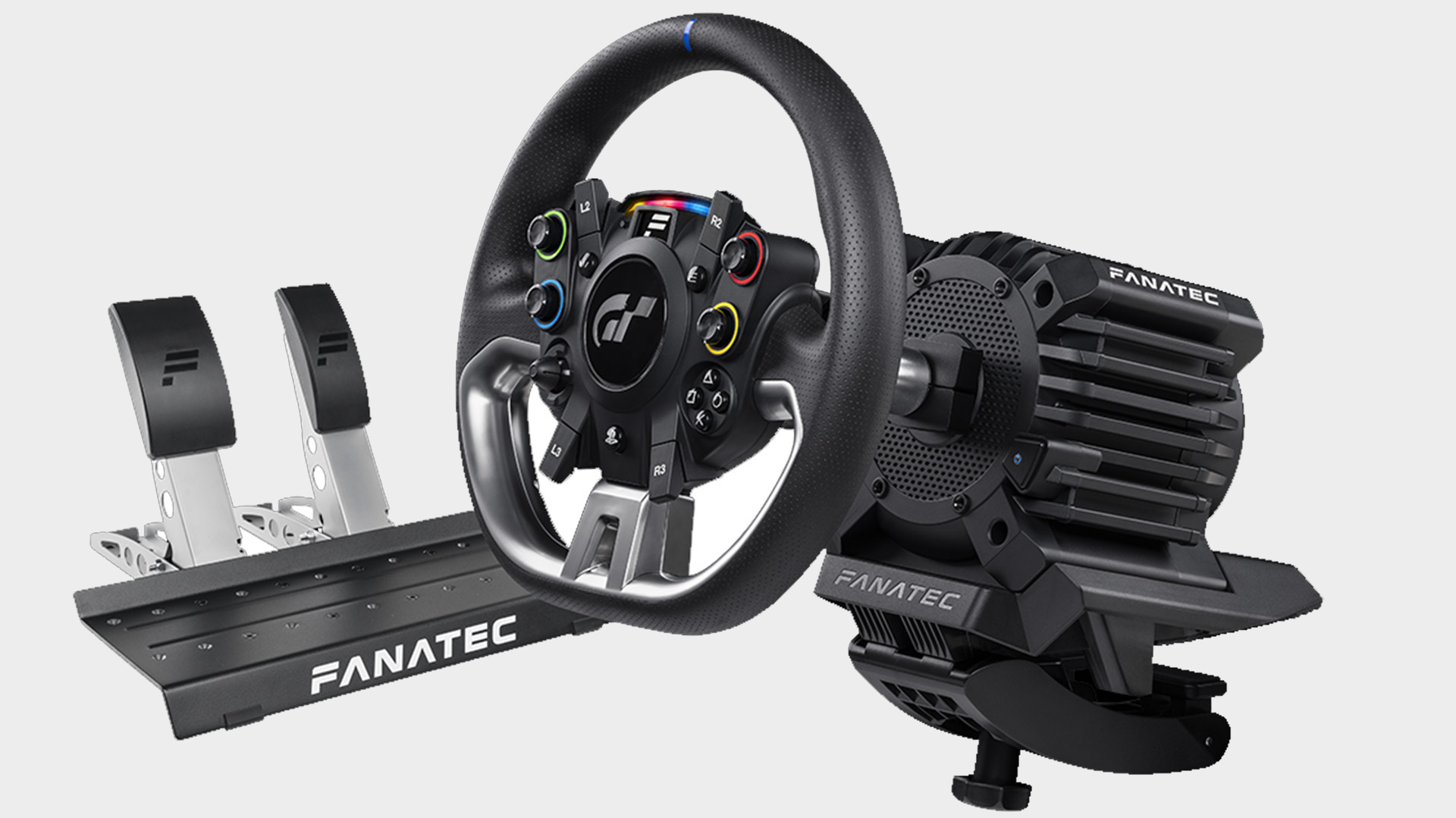
Specifications
Reasons to buy
Reasons to avoid
✅ If you're looking for something you can upgrade: Says it all really, doesn't it? The DD Pro treads the line between affordable and professional level and makes a great starting point for a very serious sim racer setup.
❌ If you want a clutch pedal as standard: Nope, not with the cheapest bundle at least. You'll have to spend a bit more than standard to get all three pedals here.
❌ If you're on a budget: While it might be cheap-ish by direct drive standards, it's definitely not cheap in general. And the Moza R5 is a cheaper option and well worth considering.
The Fanatec GT DD Pro is our top pick for the most upgradeable racing wheel. It sets a high standard for all racing wheels and makes a great starting point for any racing game enthusiast looking to leap into something more serious. The direct drive motor on offer here is decently powerful, with some seriously realistic feedback response.
Trust me, you want that. You feel every bump or loss of traction with the GT DD. I noticed my lap times started improving once I could hone in on where I was losing grip and speed during a lap. Yes, I had a few collisions along the way, but I felt like I was able to develop my race as a result.
The main practical benefit of the feedback is that really ensures you're aware when you take a little too much curb and helps you manage your traction throughout a corner. Quickly spinning back to the center means you can throw the wheel around and never feel like you're losing control over your steering in tight turns.
When you set it up just right, the GT DD Pro's finely tuned vibration and rotation transmit an incredible amount of information from the game into your hands. With a simulation-grade racing game, it's an absolute joy to throw the wheel around the track. And yes, it's technically built for Gran Turismo 7, but it's great on PC across a range of sim racing and sim-light games, such as Assetto Corsa and F1 23.
The GT DD has a pretty much immaculate construction, too, thanks to the simplicity of a straightforward clamp that slots into a solid metal wheelbase. The wheel itself is one of my favourites, too, packed to the brim with buttons that you soon become familiar with.
The CSL Pedals, unfortunately, don't come with a clutch or a load-cell brake. However, you can upgrade to a Fanatec load-cell kit, which replaces the brake and leaves the spare one to become a clutch pedal.
Everything about this kit screams versatility. I was no less comfortable in Forza Horizon than in F1 2021, despite the difference in force feedback settings. That's not something I can necessarily say about cheaper models. This isn't all down to the direct-drive technology at the heart of the GT DD Pro, either. It's also down to how simple this wheel is to set up for each game.
Fanatec has a huge range of options for pedal upgrades, wheel rims, and more. So, if you want a Formula One setup, you can buy the wheel rim to match, but if you want something a little more casual, that's fine too. Fanatec can't be beaten on this versatility, at least until you reach the real mega-bucks sim rigs.
With or without extras, this is truly one of the best ways to get into sim racing today and one of the best racing wheels I've tested.
Read our full Fanatec GT DD Pro review.
The best sim racing cockpit
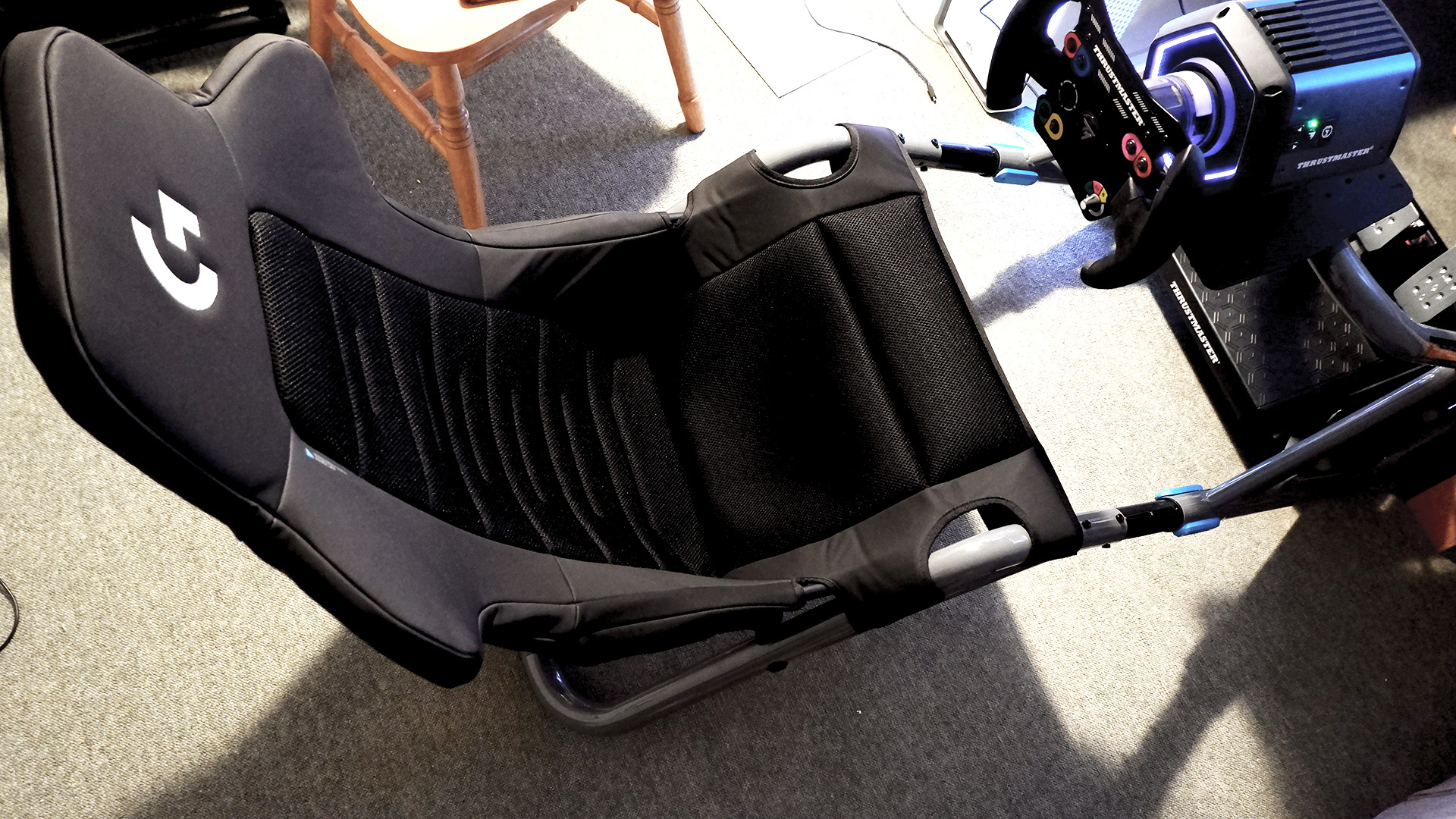
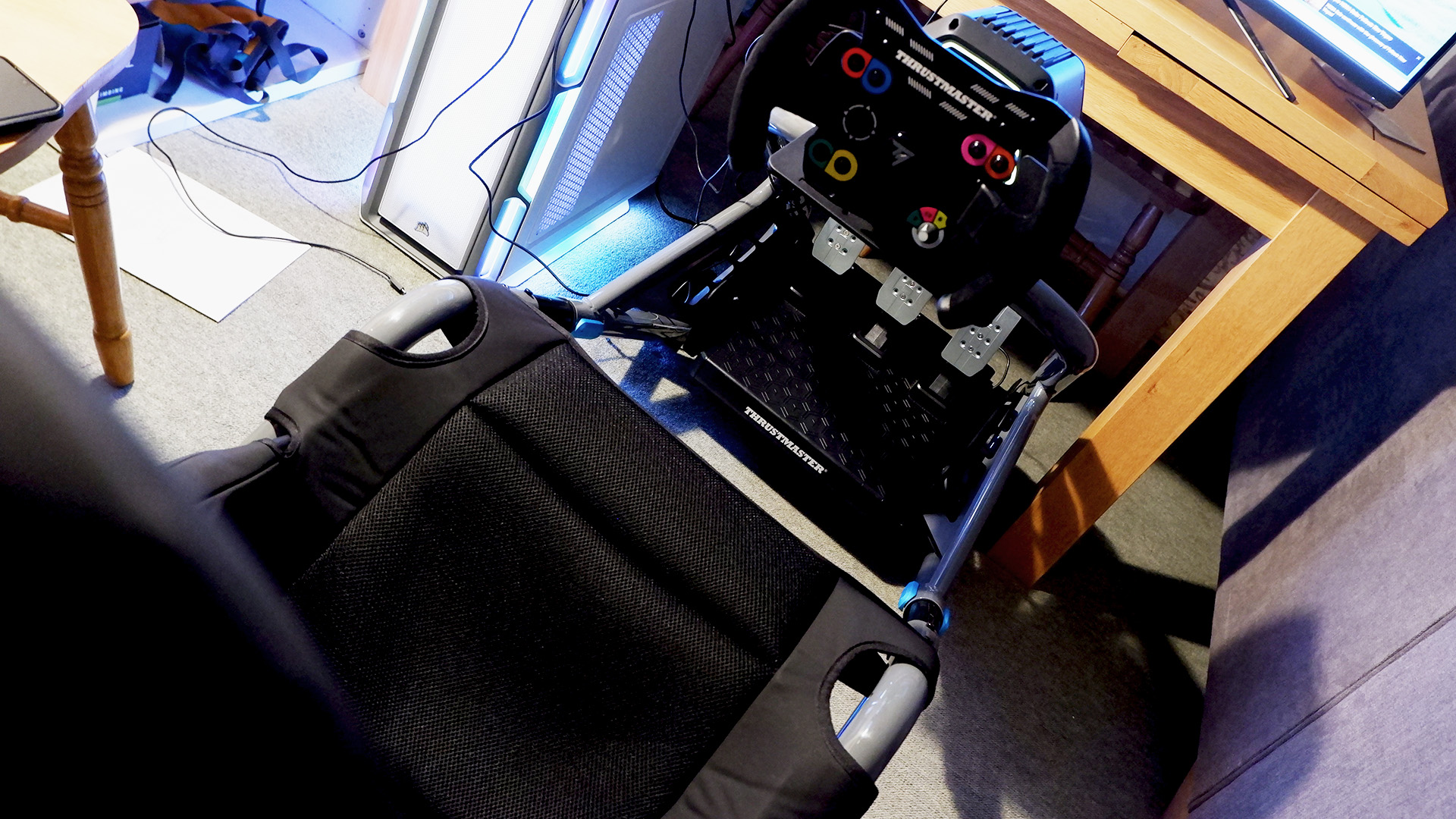
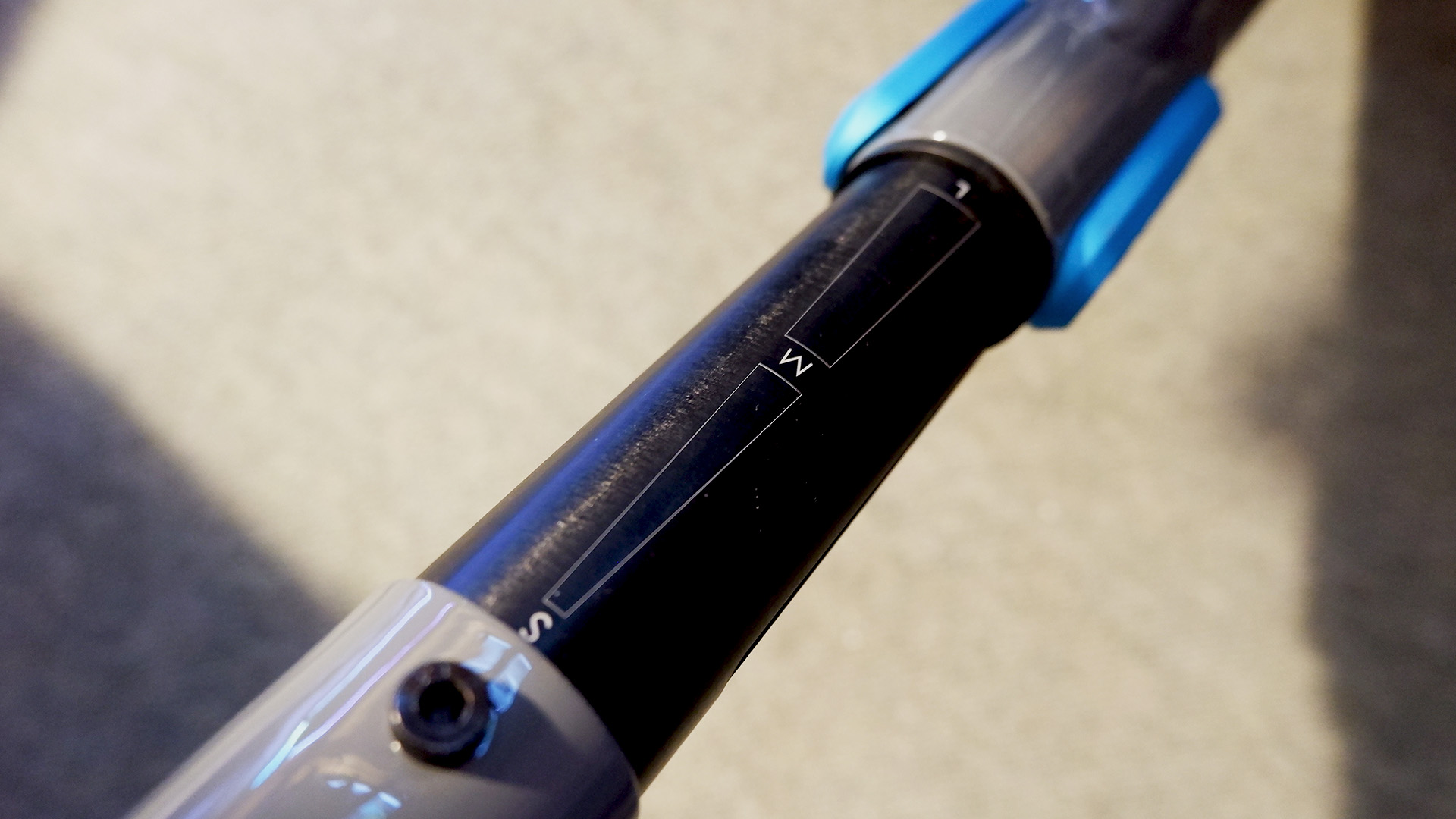
Specifications
Reasons to buy
Reasons to avoid
✅ You're looking for a full cockpit: Though a pretty comfy chair in its own right, this may be a bit overkill if you aren't looking for the level of immersion only a full-on rig can offer.
✅ You already have a wheel and pedals: This is just the seat and frame itself, so you will need to hook up your own gear to get the rig going. It really sings once you do, though.
❌ If you don't have the room: Coming with a chair, controls, and steering wheel, this is a pretty mighty bit of tech that really requires a decent bit of room to set up.
❌ You don't like a lot of setup: Due to the many parts required to put this thing together, it will take you quite some time to build it. It's a bit of a pain to store, too, although still a lot better than a standard sim rig frame.
The Playseat Trophy Logitech G Edition is one of the best ways to upgrade your current racing rig. Being essentially a seat and mount for your pedal and wheel, it can turn a simple setup into a full-on cockpit. It helps that the chair is so comfortable, I could sit on it day to day without a care, if others didn't judge me for doing so.
Starting out in the most important place, this chair is super well-built, with quality materials underlying that sturdy frame. Given that you will want to spend hours in a good racing chair, this is well-suited for the task. You simply have to pop your own wheel and pedals on the board, and you're ready to go.
As well as this, it's all very adjustable, being able to change the belt around the back of the chair for lower back support. Given that it is essentially padded fabric wrapped around a frame, it almost feels like a racing hammock, as opposed to a racing chair—and it's super comfortable as a result.
Being so well built, you can tweak many parts of the seat to get everything feeling just right. Once you've hooked up a game and got that screen pointing down at you, the experience of using this seat is downright luxurious.
It's a fairly substantial bit of gear, though, and one you need adequate room not only to use but also to store. Not only that, but the setup process is gruelling and tough. There are tons of screws and bits that slot together, all of which need adjusting and tweaking as you go.
That being said, if you have the room—and the patience—for something like this, it will add tremendously to that racing sim setup. It's about simulating a real race car, after all, and the full driving position experience really does add something tangible to the whole endeavour. Just be prepared to make some room, yes?
Read our full Playseat Trophy Logitech G Edition review.
Also tested
Thrustmaster T598
For the price, the Thrustmaster T598 offers some detailed direct drive feedback and a good set of pedals. Unfortunately, the included wheel rim feels cheap, meaning you'll want to upgrade it right away—which spoils the value proposition, if you ask us.
PC Gamer score: 68%
Read our full Thrustmaster T598 review.
Logitech G923 Trueforce
This is pretty much everything you need to get racing, with the wheel itself and a tri-pedal setup. Trueforce may be a bit niche, and you can certainly find smoother gears, but it's a solid overall package
PC Gamer score: 82%
Read our full Logitech G923 Trueforce review.
Monoprice Dark Matter GT
Though this foldable racing wheel stand can feel a tad cheap, that's because it is. The Monoprice Dark Matter GT is a great way of holding your pedals and wheel together, and it's perfect for a smaller household due to the fact you can fold it all up quickly.
PC Gamer score: 84%
Read our full Monoprice Dark Matter GT review.
Playseat Challenge X Logitech G Edition
Playseat's Challenge X is an impressive and comfortable chair that is held back by its price point and the fact that it needs fairly frequent maintenance. The rear materials are prone to dust and need to be wiped down, which gets in the way of the gaming you could be doing.
PC Gamer score: 78%
Read our full Playseat Challenge X Logitech G Edition review
Q&A
What type of force feedback is best for sim racing?
There are a few different types of force feedback commonly found in racing wheels: gear-driven, belt-driven, and direct drive. By far the most accurate and powerful is direct drive, but these also come with a high associated cost.
Direct drive is the best for feedback because it's relatively simple. Every force feedback racing wheel uses a motor to generate resistance and feedback through the wheel, and in a direct drive system, the wheel is directly mounted to this motor for maximum response and the most realistic feedback.
Don't rule out gear-driven or belt-driven designs, though. Belt-driven is a great force feedback system that uses a belt to connect the motor to the wheel. That setup offers excellent response with little compromise.
Gear-driven systems are the most popular for cheaper racing wheels, and there's a lot of variance in how these can perform depending on their design. A wheel such as the Logitech G923 uses a dual-motor gear-driven system, and we've found that to be really impressive and quite powerful in hand. That said, some lesser-designed gear-driven PC steering wheels may leave you wanting more power and response from your drive.
What parts do I need for a sim racing setup?
If you really want to go all out with your sim racing setup, a simple wheel might not suffice. That's when you'll want to look to more discrete parts and build up a sim racing rig in your own style and to your preference.
For that, you'll want to start with the base. This is essentially an axis that translates your movements on the wheel into a digital signal for your game, all the while being the driving factor of the feedback you'll feel from the game. It's important to make the right choice for your base, and that means deciding between a direct drive or belt-driven design.
For the most part, you'll find compatibility for bases varies between Xbox/PC and PlayStation/PC. You'll rarely find support for both consoles in one, but almost always PC, either way.
Then you'll need a steering wheel to mount onto your base, usually through some sort of wheel-to-base hub or adapter. This can be a more bespoke wheel for a specific motorsport, such as F1, or something more general for GT racing, or a bit of everything.
You may need to look for separate button and shifter add-ons alongside your wheel, or they may be included in one package.
Moving on to the pedals, we generally recommend picking up a set with accelerator, brake, and clutch pedals all in one. You might not be much of a manual driver now, or even need the clutch at your feet for an F1 setup, but it's useful to have for the full range of racing games. We've even set the clutch pedal to apply the handbrake in lieu of a formal handbrake accessory.
You will also want to consider how you mount this sim racing setup to your desk or sim racing frame (if you're really serious). Most of the time, that's a fairly easy process of simply buying the clamp that goes with your base from the same manufacturer, but perhaps you'll want to consider a full-on sim-racing frame for maximum immersion.
Keep up to date with the most important stories and the best deals, as picked by the PC Gamer team.

Jacob earned his first byline writing for his own tech blog. From there, he graduated to professionally breaking things as hardware writer at PCGamesN, and would go on to run the team as hardware editor. He joined PC Gamer's top staff as senior hardware editor before becoming managing editor of the hardware team, and you'll now find him reporting on the latest developments in the technology and gaming industries and testing the newest PC components.
- Andy EdserHardware Writer
